#adults so the audience will be presumed to be children and for that its got to be palatable to them
Explore tagged Tumblr posts
Text
im reading stardust (1999) and getting such a new appreciation for the film. whoever adapted the screenplay (jane goldman and matthew vaughn) has such a good understanding of how adaptations and movies work. almost every single change from novel to film works more for a film and although i know its bad practice to do so im really enjoying comparing the film and the book to see where its been changed and thinking about why it might have been changed.
#ameera speaks#as far as ive read so far humphrey is a new character and it makes sense why he exists in the film that isnt necessary for the book#captain shakespeare exists so robert deniro could get a glaad award in 2008#a lot of the changes were to make it more kid friendly which is understandable. in a movie its harder to market a fantasy love story to#adults so the audience will be presumed to be children and for that its got to be palatable to them#even stuff like giving tristan a makeover or a weeks deadline adds so much to the movie
4 notes
·
View notes
Text
Shows targeted at presumably adults that handle their subject matter and pacing like shows meant for children just aren't my cup of tea. Someone recommended Hazbin Hotel to me so I gave it a watch and the first thing that really struck me was how in terms of pacing and writing it felt like I was watching a children's show despite the fact that the characters can't go 2 minutes without saying "Fuck." I'm not going to do a deep dive so I'll just touch on my broadest complaints. This show does not trust its audience to know what's going on, it spoon feeds you almost everything to the point that it does feel sometimes like they're telling more than they're showing. Heavy topics like abuse and SA are handled with about as much nuance and subtlety as a brick thrown through a window and the show can never decide if it wants to engage seriously with them or treat them like a joke. Sometimes the visuals are impressive but I'm finding that it's a very "Style over substance" kind of show. The character designs are not my cup of tea, I find them to be very busy and even nonsensical in a way that feels more cluttered than fun. Cluttered is a good word for the show overall. It feels like it moves very quickly and doesn't really take any time to develop it's plot before it's on to the next topic. Some of the songs are alright, but the lyrics are fairly basic. They got Broadway actors to do the voice work so the quality of the singing is really good at times, at least. I feel like I would have liked this if I was in the era of being 14 and trying not to get caught watching Adult Swim by my parents on a school night but it would have been one of those shows I outgrew quickly and forgot about by the time I reached adulthood.
What I think I dislike most about the show is how much it reminds me of the more popular webtoons that have come out in recent years, where the writing and art are very simple, to the point of being childish and obvious but the target audience is older teenagers and adults. People who shouldn't need plot and character information spelled out to them like they're the My Little Pony audience.
46 notes
·
View notes
Text
talking about a show i don't actually watch (yet) as if i understand it, like an asshole (because i felt the urge to ramble about something i've been subtly noticing all year)
man, even as a semi-outsider, the wild disparity in quality between seasons of Precure is fascinating
to clarify, by "semi-outsider", i mean that in 2013 i tried to get into Precure by starting with the original season, Futari Wa, and got like twenty episodes in before i got intimidated by how much was left. a couple years later, i decided i still wanted to get into Precure, but it'd make so much more sense to jump on at the beginning of a new season and then explore the backlog from there at my own pace. i procrastinated on this for ages, but then Hirogaru Sky came out and was such a massive deal that i decided this was where i'd jump on. i still procrastinated and didn't end up starting until September. i got five episodes in, and then fell off because i got busy, but i did really enjoy those five episodes (tbh, that fifth episode was by far the best of them). i also wanted to try watching Otona Precure as it came out, but again, that was right when i got super busy. however, even though i've only seen around twenty episodes of Futari Wa and five episodes of Hirogaru Sky, i've kept up with Precure for over a decade. like i don't necessarily know much of the story or anything, but i know most of the shows' themes and can recognize most of the Cures themselves and even put a name to them. like i can see that one dark-skinned blonde girl and go "Oh yeah, that's Elena Amamiya AKA Cure Soleil from Star Twinkle. Dunno anything about her aside from the fact that she's cute, but I can immediately recognize her"
anyways, the like, 2020 seasons of Precure seemed to be on a decent track from my outside perspective. i liked the character designs and themes, and i was regularly exposed to the ongoing season even if i wasn't watching. i regularly saw the ongoing season around. in the late 2010s, it often took me a couple years to really get consistently exposed to the newer characters enough to recognize them, but in 2020-2022, i always consistently knew who the current Cures were even though i wasn't even watching the show. that seems like a good sign. not an amazing sign or anything, but a good sign.
and then 2023 happened, and Precure did two of the most interesting things it's ever done.
in the main 2023 season, Precure pulled all the twists they reasonably could with the formula of their cast. 1: the blue girl is the main character, even though she's still very much the blue girl in personality. 2: the first proper male Cure (technically the second, but the first was a minor side character; Cure Wing is a real boy Cure). 3: the first proper adult Cure (technically the third i think, but the first two both had potentially disqualifying factors (like one of them was technically only like five years old chronologically speaking or something); Ageha's barely an adult at 18, but there's no asterisks to her, she's just a normal college student). and on top of the huge departures from the expected formula they were taking, it also just seemed like really damn good season!
and THEN, they announced a second show for the year, a show that was even more exciting in concept- Otona Precure, a sequel series to the 2008 Precure show, AIMED AT ADULTS (presumably, specifically adults who grew up with that particular show, because tbh any long-running children's franchise can benefit from doing adult-oriented spinoffs so that the media can grow alongside its audience), starring the 2008 show's cast all grown up and dealing with adult problems now!!! 2023 was such a fucking banger year for exciting and compelling ideas from this franchise!
...
...
...
anyways 2024 is almost over and i've seen so fucking little of the 2024 show, Wonderful Precure. i haven't seen nothing- i do intentionally keep tabs on this fandom that i intend to join someday- but like, all i've seen is fanart. almost entirely lewd fanart, too- any given Precure season gets a lot of that, sure, but it also tends to get plenty of notable wholesome fanart too. i've seen some tame fanart, but nothing that stands out at all. i've seen no comics, no clips, no discussion- it really feels like nobody cares about the 2024 season in the slightest. sure, 2023 was an above-average year for this fandom, but i still saw plenty of activity in 2020-2022 as well! but in 2024, the only interesting stuff i've seen about Precure is about past seasons. and tbh, just from gleaning info from A: the fanart and B: official sources, i'm really not too terribly surprised. even just looking at this show and hearing about its theme, i struggle to be compelled.
like, fuck, for all i know this is actually an extremely good season and everyone's just sleeping on it, maybe because of how hookless it is. but, from my semi-outsider perspective, it really seems like Wonderful was a bit of a dud season. and the fact that this weak (or at the very least underpromoted) season directly followed possibly the most interesting year for Precure ever just makes the change so fucking visibly stark.
#antagonist originals#i am very good at operating on cursory knowledge of things#but there's a limit to how much cursory knowledge can actually carry you#so i often have to remind myself that i don't ACTUALLY know these things that i think i know
1 note
·
View note
Note
Imagine being a beloved tv show from the 90s that got milked into oblivion that your company doesn’t want you anymore. Oggy Oggy was (presumably) the last piece of OATC content we had up until that point. Xilam now had work on other projects mainly towards children’s media (except Twilight of The Gods since it’s mainly for adult audiences).
Honestly i have the thoughts as you. The new gen reboot is mid at best, and i did like some of the stories they had, but it generally didn’t stick out that much as the OG OATC episodes do. Plus, they did have mediocre episodes that were just rehashes of better OG episodes. It’s just plain generic kid shit that you’d find in shows these day (hell, the art style even complements this fact). It’s just pretty bland and too kiddish for my liking, i much prefer the older art-style better.
The comedy also has a downgrade (like you said). It has less slapstick and it’s generally not good. Although there were a few jokes that I chuckled at, but it’s still pretty boring to say the least.
They also got rid of the iconic house that Oggy had in the original, which was basically slander since that house was the most enjoyment as a kid. It really was memorable because it was just a small house with thousands of rooms in it (with those staircase chasing scene, which was so cool to see).
Hell, i think they made the characters just the same but have less charm as the original. Well, not everyone. Personally, i think Marky is like the ONLY character in the enter show that I generally liked, not because I love him, but he’s literally the only one that has good development in, like, three episodes based around him. Plus, he’s generally the only character that has charm in some places. Everyone is just the same, but with either little to no charm or just became bland as ever.
As for Oggy Oggy, it’s pretty forgettable. It has a much cuter design that the new gen reboot, but again it’s mainly for children so take that what you will.
It’s really a pain in the butt to see a show like this get treated, even in its very last season of the original run, it did have some original episodes that generally love. Other than that, Oggy should’ve had better treatment than just being Xilam’s cash cow. Although they went passed that and now working with other projects, it’s better that the show should’ve been treated better.
Although I don’t have any judgement on you saying that it should’ve ended in Season 5, I generally think that SO6 is the best was to end to end things. It could’ve easily not gone the route of remaking original episodes and just focused on original content, like SO7 did. Hell, put every single original episode from that season, make original episodes, and boom you’ve got a better season.
I wish the show did have a better comeback, but until then, there’s a chance it wouldn’t comeback with a bang.
Got any thoughts on the Oggy Spinoffs?
Ye mean Oggy Oggy and The New gen? Okay, but you probably won't like it.
I don't like The New Gen one bit. Like I get it's supposed to be for younger audiences (well, the new gen DUH), but so was the OG Oggy bro. To me it seems a little too on the nose with how overly soft and try-hard cutesy it is. I prefer when something is NOT even trying to be too cute like the OG Oggy or Space Goofs for that matter. I mean FUCK, LOOK AT DEEDEE! HE'S A CUTIE PIE!! Design goofy enough to make you smile!
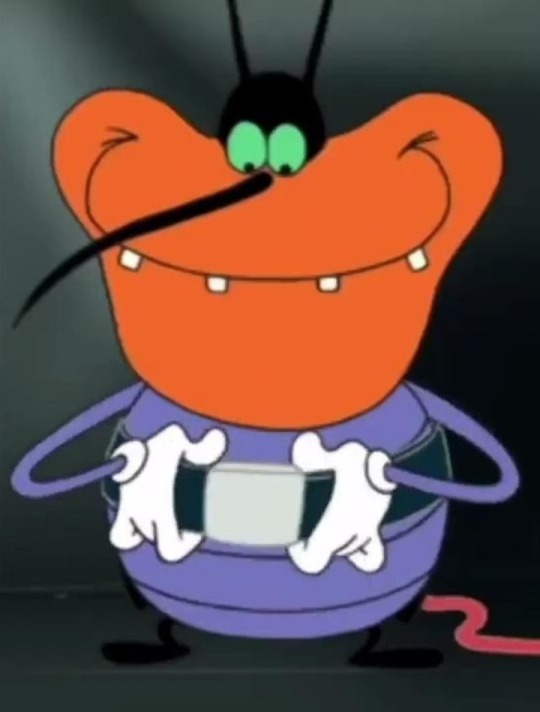
The humor also sucks in the new gen. Like there were many times where the jokes had potential, but landed SUPER POORLY. You can tell they're trying so hard to be all kid friendly, yet it fails at the one thing that makes Oggy...well Oggy! You know you can be funny AND kid friendly at the same time, right?
Also no hate to the elephant kid, but she didn't need to be a Oggy character, feel like she would've been better off with her own show, this just doesn't fit her if I'm being honest.
Basically New Gen to me feels like eating candy that's just too sweet it makes you sick. Not the worst thing I've ever seen, but definitely disappointing.
No shame if you like it tho ofc. If anything I'm glad ye could enjoy what I personally couldn't.
As for Oggy Oggy, I don't have much to say other than it clearly showing me that Oggy is a milked to death franchise at this point. I'm dying on that hill. It lowkey should've ended at S05.
#oggy and the cockroaches#oatc#i feel like I should make episodes for what season 6 would be like#without the remake episodes
14 notes
·
View notes
Text
About the Adventure: reboot, the likely reason why it exists, the question of target demographic, and whether I would recommend it or not
I think this reboot has been kind of a strange outlier in terms of Digimon anime in general, in terms of...well, just about everything. I also feel like everything surrounding it has kind of been giving us mixed signals as to what the intent and purpose behind the anime is -- well, besides “cashing in on the Adventure brand”, but looking at it more closely, that might be a bit of an oversimplification.
I’m writing this post because, having seen the entire series to the end for myself and thinking very hard about it and what it was trying to do, I decided to put down my thoughts. This is not meant to be a review of what I think was good and bad, but rather, something that I hope will be helpful to those who might be on the fence about whether they want to watch it or not, or those who don’t want to watch/finish it but are curious about what happened, or those who are curious as to why this reboot even exists in the first place, or even maybe just those who did watch it but are interested in others’ thoughts about it. I'm personally convinced that -- especially in an ever-changing franchise like Digimon -- how much you like a given work is dependent on what your personal tastes are to the very end, and thus it’s helpful to understand what kind of expectations you should go in with if you want to watch something.
With all of this said and done, if you want to go in and best enjoy this series, I think it is best to consider this anime as a distinct Digimon series of its own. The relationship to Adventure is only surface-level, and by that I mean it’s very obvious it’s doing things its own thing deliberately without worrying too much about what prior series did. Of course, I think everyone will have varying feelings about using the Adventure branding for something that really isn't Adventure at all, but we are really talking about an in-name-only affair, and something that’s unabashedly doing whatever it wants. So in other words, if you’re going in expecting Adventure, or anything that really resembles Adventure, you’re setting yourself up for disappointment. But if you’re able to approach it like yet another distinct Digimon series, and the other aspects of it fit your fancy, you’ll probably be able to enjoy it much better. And, conversely, I think it’s also important to remember that this series seems to have a writing philosophy with a fundamentally different goal from most Digimon series, and since it’s understandable for most long-time Digimon fans to have their tastes built on those prior series, it’s fine and completely understandable that this reboot may not be your cup of tea, for reasons that probably don’t actually have much to do with whether it’s an Adventure reboot or not.
There are no spoilers in the following post. (Although I use some emphatic language for the duration for it, these are mostly just my personal thoughts and how I see the series and the overall situation.)
On what exact relationship to Adventure this series has, and why it’s an “Adventure reboot”
If you ask why they did an Adventure reboot, the easiest answer to come up with is “Adventure milking, because it’s profitable”, but that’s kind of an oversimplification of what the issue is. This is especially when you take into account a key fact that official has been very well aware of since as early as 2006: most kids are too young to have seen Adventure, and therefore have no reason to care about it.
That’s the thing: Adventure milking only works so well on today’s children, and Toei and Bandai know this. This is also the reason that the franchise started going through a bit of a “split” starting in around 2012 (after Xros Wars finished airing), when the video game branch started making more active attempts to appeal to the adults’ fanbase with Re:Digitize and Adventure PSP. (Although they were technically still “kids’ games”, they were very obviously aimed at the adults’ audience as a primary “target”.) The generation that grew up with Adventure and other classic Digimon anime was getting older and older, and targeting that audience would require tailoring products more specifically to them -- ultimately culminating in 2015 and the solidification of “very obviously primarily for adults” media in the form of both games (Cyber Sleuth and Next Order) and anime (tri.). Note that Appmon ended up getting its own 3DS game, but since it was targeted at kids, it seems to have been developed by a completely different pipeline/branch from the aforementioned adults’ games, so even that had a split.
So if we want to talk about full-on nostalgia pandering, that’s already being done in the adults’ branch. In fact, Appmon development specifically said that they felt free to not really care about the adults’ audience because that was tri.’s job. Of course, the hardcore Digimon adults’ fanbase is still keeping an eye on the kids’ shows, and it’s good to not upset them -- and, besides, even if we’re all suffering under the hell of capitalism, people who work in kids’ shows still tend to be very passionate about the content and messages they’re showing the kids, so they still put an effort into making good content that adults can enjoy too. But, nevertheless, adults are still the “periphery demographic”, and a kids’ show is not a success if the kids (who have not seen and do not care about Adventure) are not watching it or buying the toys. Appmon ended up being extremely well-received by the adults’ fanbase, but that all meant nothing since the kids didn’t get into it.
Most kids are not super incredibly discerning about so-called writing quality (it’s not like they don’t at least unconsciously know when something is good, but they’re much less likely to be bothered by little things adults are often bothered by), so there’s a certain degree you have to get their attention if you want things to catch on with them. Critical reception does matter a lot more when we talk about the adults’ audience, but for the kids, the more important part is how much you’ve managed to engage them and how much fun they’re having (especially in regards to the toyline). Moreover, there’s the problem of “momentum”; Digimon’s sister shows of PreCure, Kamen Rider, and Super Sentai have sometimes had really poorly performing shows (critically or financially), but have managed to recover it in successive years to avoid getting cancelled. Digimon never managed to get to that point, with sales nearly dropping to half with Tamers and again with Frontier. So in essence, Savers, Xros Wars, and Appmon were all attempts at figuring out what was needed to just get that “kickstart” again -- but things just never lined up for it to work.
So if kids don’t really care about Adventure, why would they do Adventure nostalgia pandering? The answer is one that official has actually openly stated multiple times: they want to have parents watch it together with their children. Both Seki and Kinoshita said this in regards to watching the reaction to Kizuna, and it was also stated outright as a goal for the reboot, but, believe it or not, there’s reports of this having been stated back as early as Savers (followed by an admission that maybe 2006 was a little too early for people who grew up with Adventure to be old enough to have their own kids). So the little nostalgia references in Savers, Xros Wars, and Appmon aren't really meant to magically turn the series into Adventure as much as they’re supposed to be flags waved at the parents to get them to pay attention, so that they can introduce their kids to Digimon and watch it together with them, until the kids eventually take an interest on their own and they don’t need to rely on that kind of standby as much. (I say “as much” because of course PreCure, Rider, and Sentai all are still very indulgent in their anniversary references, but they’re not nearly as reliant on it to the point of life-and-death.)
This is also why Kizuna’s existence and release date two months prior to the reboot is a huge factor in this. The reason tri. wouldn’t have done it is that it never actually reached a properly “mainstream” audience. It’s a huge reason I keep emphasizing the fact that tri. and Kizuna are two separate things with completely different production and release formats, because tri. being a limited OVA screening released in six parts over three years means that, although it was a moderate financial success that did better than the franchise’s other niche products, in the end, it didn’t actually reach the “extremely casual” audience very well. We, as the “hardcore Internet fanbase”, all know people who watched all six parts, and the difference between tri. and Kizuna’s release formats doesn’t hit us as hard because of international distribution circumstances, but even on our end, if you talk to your casual friends who barely remember anything about Digimon except what they saw on TV twenty years ago, you will almost never find anyone who got past Part 1, maybe 2 at most. (That’s before we even get into the part where a good chunk of them got turned off at the character design stage for being too different.) Sticking with a full six-part series over three years is a commitment, and if you’re not someone with a certain level of loyalty to the franchise, you aren’t as likely to put aside the time for it!
Kizuna, on the other hand, was a full-on theatrical movie with full marketing campaign that was aimed at that extremely casual mainstream audience, including a lot of people who hadn’t even heard of tri. (due to it being too niche) or hadn’t bothered to commit to watching something so long, and thus managed to “hype up” a lot of adults and get them in a Digimon mood. (Critical reception issues aside, this is also presumably a huge reason Kizuna isn’t all that reliant on tri.’s plot; Adventure and 02 both averaged at around 11% of the country watching it when it first aired, but the number of people who even saw tri. much less know what happened in it is significantly lower, so while you can appeal to a lot of people if you’re just targeting the 11%, you'll lock them out if you’re overly reliant on stuff a lot of them will have never seen in the first place.) We’re talking the kind of super-casual who sees a poster for Kizuna, goes “oh I remember Digimon!”, casually buys a ticket for the movie, likes it because it has characters they remember and the story is feelsy, and then two months later an anime that looks like the Digimon they recognize is on Fuji TV, resulting in them convincing their kid to watch it together with them because they’re in a Digimon mood now, even though the actual contents of the anime are substantially different from the original.
So, looking back at the reboot:
There’s a huge, huge, huge implication that the choice to use Adventure branding was at least partially to get Fuji TV to let them have their old timeslot back. Neither Xros Wars nor Appmon were able to be on that old timeslot, presumably because Fuji TV had serious doubts about their profitability (perhaps after seeing Savers not do very well). This isn’t something that hits as hard for us outside Japan who don’t have to feel the impact of this anyway, but it’s kind of a problem if kids don’t even get the opportunity to watch the show in the first place. While there’s been a general trend of moving to video-on-demand to the point TV ratings don’t really have as much impact as they used to, I mean...it sure beats 6:30 in the morning, goodness. (Note that a big reason PreCure, Rider, and Sentai are able to enjoy the comfortable positions they’re in is that they have a very luxurious 8:30-10 AM Sunday block on TV Asahi dedicated to them.)
Since we’re talking about “the casual mainstream”, this means that this kind of ploy only works with something where a casual person passing by can see names and faces and take an interest. This is why it has to be Adventure, not 02 or Tamers or whatnot; 02 may have had roughly similar TV ratings to Adventure and fairly close sales figures back in 2000, but the actual pop culture notability disparity in this day and age is humongous (think about the difference in pop culture awareness between Butter-Fly and Target). 02, Tamers, and all can do enough to carry “adults’ fandom” products and merch sales at DigiFes, and the adults’ branch of the franchise in general, but appealing to the average adult buying toys for the kids is a huge difference, and a big reason that, even if they’re clearly starting to acknowledge more of the non-Adventure series these days, it’s still hard to believe they’re going to go as far as rebooting anything past Adventure -- or, more accurately, hard to believe they’ll be able to get the same impact using names and faces alone.
This advertising with the Adventure brand goes beyond just the anime -- we’re talking about the toyline that has the involved character faces plastered on them, plus all of the ventures surrounding them that Bandai pretty obviously carefully timed to coincide with this. One particularly big factor is the card game, which is doing really, really well right now, to the point it’s even started gaining an audience among people who weren’t originally Digimon fans. Part of it is because the game’s design is actually very good and newcomer-friendly, but also...nearly every set since the beginning came with reboot-themed Tamer Cards, which means that, yes, those cards with the Adventure names and faces were helping lure people into taking an interest in the game. Right now, the game is doing so well and has gained such a good reputation that it probably doesn’t need that crutch anymore to keep going as long as the game remains well-maintained, but I have no doubt the initial “Adventure” branding was what helped it take off, and its success is most likely a huge pillar sustaining the franchise at the current moment.
Speaking of merch and toys, if you look closely, you might notice that Bandai decided to go much, much more aggressively into the toy market with this venture than they ever did with Savers, Xros Wars, or Appmon (Appmon was probably the most aggressive attempt out of said three). They put out a lot more merch and did a lot more collaborative events to engage the parents and children, and, presumably, the reason they were able to do this was because they were able to push into those outlets with the confidence the Adventure brand would let them be accepted (much like with Fuji TV). Like with the card game, the important part was getting their “foot in the door” so that even if it stopped being Adventure after a fashion, they’d still have all of those merchandising outlets -- after all, one of the first hints we ever got of Ghost Game’s existence was a July product listing for its products replacing the reboot’s in a gachapon set, so we actually have evidence of certain product pipelines being opened by the reboot’s precedent. (The word 後番組 literally means “the TV program that comes after”, so it’s pretty obvious this was intended for Ghost Game; in other words, the reboot’s existence helped ensure there be a “reservation” for this kind of product to be made.)
I think one important thing to keep in mind is that Toei and Bandai have as much of a stake in avoiding rehashing for their kids’ franchises as we do. Even if you look at this from a purely capitalistic perspective, because of how fast the “turnover” is for the kids’ audience, sustaining a franchise for a long time off rehashing the same thing over and over is hard, and even moreso when it involves a twenty-year-old anime that said kids don’t even know or remember. Ask around about popular long-running Japanese kids’ franchises and you’ll notice they practically rely on being able to comfortably change things up every so often, like PreCure/Rider/Sentai shuffling every year, or Yu-Gi-Oh! having a rotation of different series and concepts, or the struggles that franchises that don’t do this have to deal with. And, after all, for all people are cynical about Toei continuing to milk Adventure or any of the other older series at every opportunity, as far as the kids’ branch of the franchise goes, this is only capable of lasting to a certain extent; if they tried keeping this up too long, even the adults and kids would get bored, and there is some point it’ll be easier to try and make products directly targeted at the kids’ audience instead of having to rely on the parents to ease them into it.
So it’s completely understandable that the moment they secured a proper audience with the reboot and finished up their first series with this, they decided to take the risk with Ghost Game right after. And considering all that’s happened, this is still a risk -- they’re changing up a lot (even if not as much as Appmon), and there’s a chance that the audience they’ve gathered is going to shoot down again because they’ve changed so much and they no longer have the Adventure branding as a “crutch” to use -- but they’re taking it anyway instead of going for something at least slightly more conventional.
Which means that, yes, there’s a possibility this will all explode in their face, because the Adventure branding is that huge of a card they’re about to lose. But at the very, very least, Ghost Game is coming in with the “momentum” and advantage that Savers, Xros Wars, and Appmon all didn’t have: a brand currently in the stage of recovery, all of the merchandising and collaborative pipelines the reboot and Kizuna opened up, a fairly good timeslot, and a premise somewhat more conventional than Xros Wars and Appmon (I’m saying this as someone who likes both: their marketing definitely did not do them many favors). There are still a lot of risks it’s playing here, and it’s possible it won’t be the end of more Adventure or reboot brand usage to try to keep that momentum up even as we go into Ghost Game, but it’s the first time in a long while we’ve had something to stand on.
Okay, so that’s out of the way. But the end result is that we now have 67 episodes of an Adventure “reboot” that actually doesn’t even resemble Adventure that much at all, which seems to have achieved its goal of flagging down attention so it can finally going back to trying new things. This series exists, we can’t do anything about the fact it exists, the period where its own financial performance actually mattered is coming to an end anyway, and we, as a fanbase of adults hanging out on the Internet keeping up with the franchise as a whole, have to figure out how each of us feels about this. So what of it?
About the contents of the reboot itself
One thing I feel hasn’t been brought up as a potential topic very much (or, at least, not as much as I feel like it probably should be) is that the reboot seems to be actively aimed at a younger target audience than the original Adventure. It hasn’t been stated outright, but we actually have quite a bit of evidence pointing towards this.
Let’s take a moment and discuss what it even means to have a different target audience. When you’re a kid, even one or two years’ difference is a big deal, and while things vary from kid to kid, generally speaking, it helps to have an idea of what your “overall goal” is when targeting a certain age group, since at some point you have to approximate the interests of some thousands of children. Traditionally, Digimon has been aimed at preteens (10-11 year olds); of course, many will testify to having seen the series at a younger age than that, but the "main” intended target demographic was in this arena. (Also, keep in mind that this is an average; a show aimed at 10-11 year olds could be said to be more broadly aimed at 7-13 year olds, whereas one aimed at 7-8 year olds would be more broadly aimed at something like 5-10 year olds.) Let’s talk a bit about what distinguishes children’s shows (especially Japanese kids’ shows) between this “preteen demographic” and things aimed at a much younger audience (which I’ll call “young child demographic”, something like the 7-8 year old arena):
With children who are sufficiently young, it’s much, much more difficult to ensure that a child of that age will be able to consistently watch TV at the same hour every week instead of being subject to more variable schedules, often set by their parents, meaning that it becomes much more difficult to have a series that relies on you having seen almost every episode to know what’s going on. For somewhat older kids, they’re more likely to be able to pick and pursue their own preferences (the usual “got up early every week for this show”). This means that shows targeted at a young child demographic will be more likely to be episodic, or at least not have a complex dramatic narrative that requires following the full story, whereas shows targeted at a preteen audience are more willing to have a dramatic narrative with higher complexity. This does not mean by any shake of the imagination that a narrative is incapable of having any kind of depth or nuance -- the reboot’s timeslot predecessor GeGeGe no Kitaro got glowing reviews all over the board for being an episodic story with tons of depth -- nor that characters can’t slowly develop over the course of the show. But it does raise the bar significantly, especially because it prevents you from making episodes that require you to know what happened in previous ones.
The thing is, the original Adventure and the older Digimon series in general didn’t have to worry about this, and, beyond the fact that their narratives very obviously were not episodic, we actually have concrete evidence of the disparity: Digimon has often been said to be a franchise for “the kids who graduated from (outgrew) a certain other monster series”. Obviously, they’re referring to Pokémon -- which does have the much younger target demographic. That’s why its anime is significantly more episodic and less overall plot-oriented, and Digimon wasn’t entirely meant to be a direct competitor to it; rather, it was hoping to pick up the preteens who’d enjoyed Pokémon at a younger age but were now looking for something more catered to them. This is also why, when Yo-kai Watch came into the game in 2014, that was considered such a huge direct competitor to Pokémon, because it was aiming for that exact same demographic, complete with episodic anime. When Yo-kai Watch moved to its Shadowside branch in 2017, it was specifically because they had concerns about losing audience and wanted to appeal to the kids who had been watching the original series, but since they were preteens now, they adopted a more dramatic and emotionally complex narrative that would appeal to that audience instead. So you can actually see the shift in attempted target demographic in real time.
Adventure through Frontier were aimed at 10-11 year olds, and here’s the interesting part: those series had the protagonists hover around the age of said target audience. We actually have it on record that Frontier had a direct attempt to keep most of the kids as fifth-graders for the sake of appealing to the audience, and so that it would be relatable to them. You can also see this policy of “matching the target audience’s age” in other series at the time; Digimon’s sister series Ojamajo Doremi (also produced by Seki) centered around eight-year-olds. Nor was Seki the only one to do this; stepping outside Toei for a bit, Medabots/Medarot had its protagonist Ikki be ten years old, much like Digimon protagonists, and the narrative was similarly dramatic. The thing is, that’s not how it usually works, and that’s especially not really been how it’s worked for the majority of kids’ series since the mid-2000s. In general, and especially now, it’s usually common to have the protagonists of children’s media be slightly older than the target age group. This has a lot of reasons behind it -- partially because kids are looking to have slightly older characters as a model for what to follow in their immediate future, and partially because “the things you want to teach the kids” are often more realistically reflected if the kids on screen have the right level of independence and capacity for emotional contemplation. Case in point: while everyone agrees the Adventure through Frontier characters are quite relatable, it’s a common criticism that the level of emotional insight sometimes pushes the boundary of what’s actually believable for 10-11 year olds...
...which is presumably why, with the exception of this reboot, every Digimon TV series since, as of this writing, started shifting to middle school students. That doesn’t mean they’re aiming the series at middle school kids now, especially because real-life 13-15 year olds are usually at the stage where they pretend they’ve outgrown kids’ shows (after all, that’s why there’s a whole term for “middle school second year syndrome”), but more that the narrative that they want to tell is best reflected by kids of that age, especially when we’re talking characters meant to represent children from the real world and not near-immortal youkai like Kitaro. In fact, the Appmon staff outright said that Haru was placed in middle school because the story needed that level of independence and emotional sensitivity, which is interesting to consider in light of the fact that Appmon’s emotional drama is basically on par with that of Adventure through Frontier’s. So in other words, the kind of high-level drama endemic to Adventure through Frontier is would actually normally be more on par with what you’d expect for kids of Haru’s age.
But at this point, the franchise is at a point of desperation, and you can see that, as I said earlier, Appmon was blatantly trying to be one of those “have its cake and eat it too” series by having possibly one of the franchise’s most dramatic storylines while also having some of the most unsubtle catchphrases and bright colors it has to offer. Moreover, one thing you might notice if you look closely at Appmon: most of its episodes are self-contained. Only a very small handful of episodes are actively dependent on understanding what happened in prior episodes to understand the conflict going on in the current one -- it’s just very cleverly structured in a way you don’t really notice this as easily. So as you can see, the more desperate the franchise has gotten to get its kids’ audience back, the more it has to be able to grab the younger demographic and not lock them out as much as possible -- which means that it has to do things that the original series didn’t have to worry about at all.
Having seen the reboot myself, I can say that it checks off a lot of what you might expect if you tried to repurpose something based on Adventure (and only vaguely based on it, really) into a more episodic story that doesn’t require you to follow the whole thing, and that it has to break down its story into easy-to-follow bits. In fact, there were times where I actually felt like it gave me the vibes of an educational show that would usually be expected for this demographic, such as repeated use of slogans or fun catchphrases for young kids to join in on. That alone means that even if the “base premise” is similar to the original Adventure, this already necessitates a lot of things that have to be very different, because Adventure really cannot be called episodic no matter how you slice it.
Not only that, even though the target audience consideration has yet to be outright stated, we also have interviews on hand that made it very clear, from the very beginning, what their goals with the reboot were: they wanted the kids to be able to enjoy a story of otherworldly exploration during the pandemic, they wanted cool action sequences, and they wanted to get the adults curious about what might be different from the original. Note that last part: they actively wanted this series to be different from the original, because the differences would engage parents in spotting the differences, and the third episode practically even goes out of its way to lay that message down by taking the kids to a familiar summer camp, only to have it pass without incident and go “ha, you thought, but nope!” Moreover -- this is the key part -- “surprising” people who were coming from the original series was a deliberate goal they had from the very beginning. They’ve stated this outright -- they knew older fans were watching this! They were not remotely shy about stating that they wanted to surprise returning viewers with unexpected things! They even implied that they wanted it to be a fun experience for older watchers to see what was different and what wasn’t -- basically, it’s a new show for their kids who never saw the original Adventure, while the parents are entertained by a very different take on something that seems ostensibly familiar.
On top of that, the head writer directly cited V-Tamer as an influence -- and if you know anything about V-Tamer, it’s really not that much of a character narrative compared to what we usually know of Digimon anime, and is mostly known for its battle tactics and action sequences (but in manga form). In other words, we have a Digimon anime series that, from day one, was deliberately made to have a writing philosophy and goal that was absolutely not intended to be like Adventure -- or any Digimon TV anime up to this point -- in any way. And that’s a huge shock for us as veterans, who have developed our tastes and expectations based on up to seven series of Digimon that were absolutely not like this at all. But for all it's worth, the circumstances surrounding its production and intent don't seem to quite line up with what the most common accusations against it are:
That it’s a rehash of Adventure: It really isn’t. It’s also blatantly apparent it has no intention of being so. The points that are in common: the character names and rough character designs, some very minimal profile details for said characters, Devimon having any particular foil position to Angemon, the use of Crests to represent personal growth, the premise of being in the Digital World and...that’s it! Once those points are aside, it’s really hard to say that the series resembles Adventure any more than Frontier or Xros Wars resembles Adventure (which are also “trapped in another world” narratives) -- actually, there are times the series resembles those two more than the original Adventure, which many have been quick to point out. The majority of things you can make any kind of comparison to basically drop off by the end of the first quarter or so, and trying to force a correlation is basically just that: you’d have to try forcing the comparison. The plot, writing style, and even the lineup of enemies shown just go in a completely different direction after that. So in the end, the base similarities can be said to be a marketing thing; if I want to criticize this series, I don’t think “lack of creativity” would actually be something I would criticize it for. (Of course, you’re still welcome to not be a huge fan of how they’re still guilty of using Adventure’s name value to market something that is not actually Adventure. We’re all gonna have mixed feelings on that one.)
That they don’t understand or remember Adventure’s appeal: Unlikely. All of the main staff has worked on character-based narratives before, which have been very well-praised while we’re at it. The producer, Sakurada Hiroyuki, was an assistant producer on the original series, and I would like to believe he probably remembers at least a thing or two about what they were doing with the original series...but, also, he’s the producer of Xros Wars, which definitely had its own individuality and style, and, moreover, was more of a character narrative that people generally tend to expect from Digimon anime. (Still a bit unconventional, and it has its own questions of personal taste, but a lot of people have also pointed out that this reboot has a lot in common with Xros Wars in terms of its writing tone and its emphasis on developing Digital World resident Digimon moreso than the human characters.) All signs point to the idea they could make a character narrative like Adventure if they really wanted to. It’s just, they don’t want to do that with this reboot, so they didn’t.
That they misinterpreted or misremembered the Adventure characters: There’s been accusations of said characters being written in a way that implies misinterpretation or lack of understanding of the original characters, but the thing is, while I definitely agree they have nowhere near the depth of the original ones, there are points that seem to be deliberate changes. (At some points, they’re actually opposites of the original, and certain things that operate as some very obscure references -- for instance, Sora complaining about having to sit in seiza -- seem to also be deliberate statements of going in a different direction.) The lack of human character depth or backstory doesn’t seem to be out of negligence, but rather that this story doesn’t want to be a character narrative to begin with -- after all, we’re used to seven series of Digimon that are, but there are many, many kids’ anime, or even stories in general, where the story is more about plot or action than it is completely unpacking all of its characters’ heads. In this case, this reboot does seem to have characters that are taking cues from or are “inspired by” the original, but, after all, it’s an alternate universe and has no obligation to adhere to the original characters’ backgrounds, so it stands to reason that it’d take liberties whenever it wanted. (Again, the head writer outright stated that he based the reboot’s Taichi more on V-Tamer Taichi than the original Adventure anime Taichi. He knows there’s a difference!) Even more intriguingly, the series actually avoids certain things that are common misconceptions or pigeonholes that would normally be done by the mainstream -- for instance, the Crest of Light (infamously one of the more abstract ones in the narrative) is fully consistent with Adventure’s definition of it as “the power of life”, and, if I dare say so myself, Koushirou’s characterization (emphasizing his relationship with “knowledge” and his natural shyness) arguably resembles the original far more than most common fan reductions of his character that overemphasize his computer skills over his personal aptitude. In other words, I think the staff does know what happened in the original Adventure -- they just actively don’t want to do what Adventure did, even if it’s ostensibly a reboot.
That it’s soulless or that there’s no passion in its creation: Well, this is subjective, and in the end I’m not a member of the staff to tell you anything for sure, but there are definitely a lot of things in this anime that don’t seem like they’d be the byproduct of uninspired creation or lack of passion. It’s just that those things are all not the kinds of things that we, as Digimon veterans, have come to develop a taste for and appreciate in Digimon anime. That is to say, there is an incredible amount of thought and detail put into representing Digimon null canon (i.e. representing special attacks and mechanics), the action sequences are shockingly well-animated in ways that put most prior Digimon anime to shame, and the series has practically been making an obvious attempt to show off as many Digimon (creatures) that haven’t traditionally gotten good franchise representation as they can. Or sometimes really obscure “meta fanservice” references that only make sense to the really, really, really, really hardcore longtime Digimon fan (for instance, having an episode centered around Takeru and Opossummon, because Takeru’s voice actress Han Megumi voiced Airu in Xros Wars). If you follow any of the animators on Twitter, they seem to be really actively proud of their work on it, and franchise creators Volcano Ota and Watanabe Kenji seem to be enjoying themselves every week...so basically, we definitely have creators passionate about having fun with this, it’s just that all of it is being channeled here, not the character writing.
So in the end, you can basically see that this series is basically the epitome of desperately pulling out all of the stops to make sure this series lands with the actual target demographic of children, dammit, and gets them into appreciating how cool these fighting monsters are and how cool it would be if they stuck with them even into a series that’s not Adventure. The Adventure branding and names to lure in the parents, the straightforward and easy-to-understand action-oriented narrative so that kids will think everything is awesome and that they’ll like it even when the story changes, and the merchandise and collab events booked everywhere so that they can all be reused for the next series too...because, remember, they failed with that during Savers, Xros Wars, and Appmon (I mean, goodness, you kind of have to admire their persistence, because a ton of other kids’ franchises failing this many times would have given up by now), so it’s a bit unsurprising that they went all the way to get the kids’ attention at the expense of a lot of things that would attract veterans, especially since the veterans already have a well-developed adults’ pipeline to cater to them. This does also mean that this series is more likely to come off as a 67-episode toy commercial than any previous Digimon series, but it’s not even really the toys as much as they’re trying to sell the entire franchise and the actual monsters in the hopes that they’ll stick with it even when the narrative changes.
Nevertheless, here we are. The series is over. Ghost Game -- which, as of this writing, is looking to be much more of a conventional Digimon narrative, complete with older cast, obviously more dramatic atmosphere, and pretty much everything surrounding its PR -- is on its way, presumably thanks to the success of this endeavor. It’s hard to gauge it; we have it on record that they also intend it to be episodic, but remember that this doesn’t necessarily prevent it from having an overall dramatic plot or nuanced drama (especially since the abovementioned Appmon and Kitaro were perfectly capable of pulling off this balance). Nevertheless, it seems to be a lot more of the conventional kind of Digimon narrative we usually expect, so, as for us, adult long-time fans of the Digimon franchise (many of whom don’t have kids anyway), what exactly should we make of this? Well, as far as “supporting the franchise” goes, you’ll get much more progress supporting Ghost Game than the reboot; I highly doubt view counts and merch sales relative to an already-finished series will do nearly as much for the franchise’s health as much as the currently airing series, and, besides, it’d probably do us all a favor to support the endeavor that’s actually new and fresh. So when it comes to a “past” series like this, it’s all just going to come down to a question of personal preference and taste: is this a series you, personally, want to watch, and would you find it entertaining?
For some of you, it’s possible that it just won’t be your cup of tea at all -- and since, like I said, the majority of us here have based our expectations and preferences on up to seven series of Digimon that were not like this, that’s also perfectly fine, and in that case I don’t actually recommend you watch this. Of course, I’ve never thought that it was ever fair to expect a Digimon fan to have seen all of the series released to date; the more series we get, the more inhumane of a demand that’ll become, and I think this franchise becoming successful enough to have so many series that most people won’t have seen it all is a good thing. (It’s actually kind of alarming that the percentage of people who have seen it all is so high, because it means the franchise has failed to get much of an audience beyond comparatively hardcore people who committed to it all the way.) But I think, especially in this case, with a series for which adult fans like us were probably lowest on the priority list due to the sheer amount of desperation going on here, it’s fine to skip it, and if you’re someone who lives by a need for character depth or emotionally riveting narrative, the fact this series is (very unabashedly and unashamedly) mostly comprised of episodic stories and action sequences means you won’t have missed much and probably won’t feel too left out of any conversations going forward. That’s before we even get into the part where it’s still completely understandable to potentially have mixed feelings or resentment about the overuse of the Adventure brand for something like this, especially if Adventure is a particularly important series to you.
But for some of you out there, it might still be something you can enjoy on its own merits. I’ve seen people who were disappointed by the limited degree of Digimon action sequences in the past or the fact that the series has gotten overly fixated on humans, and had an absolute ball with the reboot because it finally got to represent parts of the franchise they felt hadn’t been shown off as well. “Fun” is a perfectly valid reason to enjoy something. It’s also perfectly possible to be someone who can enjoy character narratives like the prior Digimon series but also enjoy something that’s more for being outlandish and fun and has cool Digital World concepts and visuals -- and, like I said, it does not let up on that latter aspect at all, so there’s actually potential for a huge feast in that regard. I think as long as you don’t expect it to be a character narrative like Adventure -- which will only set you up for disappointment, because it’s not (and made very clear since even the earliest episodes and interviews that it had no intention of being one) -- it’s very possible to enjoy it for what it is, and for what it does uniquely.
#digimon#digimon adventure:#digimon adventure reboot#digimon adventure 2020#digimon adventure psi#shihameta
108 notes
·
View notes
Text
Okay fine we're doing this. I havent read the books and I'm probably not going to I've only seen the movies so I'm sorry if anything I say is contradictory or has already been stated.
So! Descendants 3 was kinda shit and I dont like it but especially because of the ending because everybody was like "oh yeah island is open and we're all happy with no worries or implications about free villains or people being spiteful about being imprisoned for years!" In fact if anything they joked about those things.
The island is basically its own culture, I can't say how long it's been around, long enough for some almost adult kids to be about and to develop a kind of community.
The Isle is a place of poverty, people are dirty and on the street, eveyone steals from each other and most people don't put much effort into appearance upkeep (personal or of the sourounding area) not because of laziness or being "evil" but because they clearly don't have time or luxury to do such things or possibly even the clean water. Does the Isle have clean water?? How to they get electricity??? Someone tell me!
Another thing that I've noticed is easy to see but is not much explicitly said is the unique style of those on the Isle. As previously stated they don't have much but those who have the most "power" and such on the Isle are the best example of this As they have the most colourful outfits. However these outfits are often made out of patches and ripped things put together, even salvaged things like nets and chains as we can see on thing like Uma and Harry's outfits in D3 they make the best of what they've got and they do fantastic because their outfits are intricate and detailed and just tell you everything you need to know about them. Which is why it's a damn s h a m e when the original VK's ajust their style to be more like Auradon's. That's not an improvement! Be proud of where you came from!! It's like they forgot what it was like being on the Isle in D3!
Moving on, here's something that was touched on in D2 but not enough. Equality. On the Isle there is basically equal opportunity as in saying everything is shit and nome cares what gender and presumably what sexuality you are as long as you can work. Sexism is shown to be almost casual in aurodon from the looks of it, Chad makes sexist comments and litterally none else says anything or seems to see anything wrong with it except Jay who caves to pressure from peers and expectations. He does redeem himself because he's from the isle and he knows you shouldn't give a shit about anyone's gender or anything. If they can do something and ask to be included you give them that opportunity. The sexism is also implied in the way that the rule book has men written specifically in the first place and that it has taken until then for anyone but boys to be allowed on any kind of sports team. We never see it! It seems to be the hetronormative veiw where the boys do sport and girls do cheerleeding and other genders? What other genders? Never heard of that? BAD AURADON!! I bet there's so many trans folk on the island just living their lives, thinking Aurodon is the better place and not knowing that it's a cis het filled nightmare.
Okay no I'm headcannoning now, if their are now a bunch of Isle kids at auradon prep they find it fucking aweful the way all these preppy royals are treating them and make the first LGBT club in Auradon. There is lots of pushback and they get bullied a fuck ton for making themselves the most prominent queer folk in the school until a fight breaks out and the club demand that they should be treated better, taking all the evidence to fairy godmother who is very hesitant because COME ON she's never been that great she is biased to Auradon kids and if putting away those in the Isle is brought up she is all on it, she is jelly spined about doing anything against the royal kids. So the kids are like "Fine, if you won't help us we'll take this to the King himself!" Well mainly the queer mom's of the group (you know the ones I'm talking about) who lead the others and protect the anxious queers as they storm to Ben at his fucking locker and demand an audience because they are being harassed and bullied and none is doing anything. Ben had no idea there was even a LGBT club (too busy ig) and is gassed there is one for a moment before he's like "wait people are harassing you?" So Bisexual King Ben gets his lovely Bi wife and they start coming to club meetings and investing in the pins and stuff the club makes. Most club members are pleased but the queer mom's are apprehensive that this will help until some assholes come to the club to do their usual bullying only to find King and Queen Beast themselves siting there with rainbow bracelets and bi pins and all trying to have a nice old time eating their fucking cupcakes what the fuck are yall doing? The bullying dies down quick once they realise it ain't gonna fly, the other OG VK's that hear about this become members and very protective over their queer children. Did I mention Dizzy and Ceila are a part of the club? They're girlfriend's. Celia is one of the queer moms. Harry becomes one of the biggest protectors over the group as the pan dad. He's been going around snogging everyone and anyone wholl snog him everyone already knew he was queer they just didn't have the balls to try and bully him over it as much as they bullied the lil club members. But now Harry can often be seen in jackets and shit with pan and general queer patches and pins and running around with his gay children yelling "MOVE WE'RE GAY!!" He totally calls them his queer crew. Anyway as a result lots of queer royals start coming out of the woodwork, obvs Lonnie is one of them, and the club eventually serves to bring members of Auradon and the Isle close together.
Where was I? Yada yada auradon expects girls to be pretty princesses and boys to be brave knights or dashing princes. It's shit and should stop being portrayed as good. Moving on!
Food! One of the things we'll established in all movies is that the food of the Isle is shit compared to food of Auradon. The Isle has no fresh fruit which likely means its almost impossible for things to grow there which is fair because again there doesn't seem to be much fresh water and there are always clouds overhead so no sun. Maybe there is some people trying really hard to grow stuff but the general attitude of the Isle seems to be "there is no time for that" and fruits are forgotten so much that the VK's litterally don't knownwhat they are when they come across them. That and anything containing sugar. Actually it's mention by Dizzy and Celia that they enjoy the fact that the cake dosent have dirt or flies so basically food there is terrible. We don't see much food on the Isle but what we do see seems to be beans, eggs, chips and shellfish. Basically protine and carbs that can be easily stored and produced. To be fair beans are kidna good for you but they're likely a sign that if they get any imports from the mainland it is canned stuff. Prison food. There's probably some chef villain that is trying their best to make good food out of the shit but honestly the Isle dwellers should be angry that they've been deprived of good food for so long not happy they're finally been given decency.
Moving on, music! Auradon dosent have nearly as many musical numbers it seems, the Isle songs have a distinct style, to them, the villains that basically "founded" the place were masters of the dramatic songs (with backup or solo) so banging music is basically ingrained in the music's culture, even for battle as we see with the fight between Mal and Uma in D3. Meanwhile Auradon seems to have mainly romance and "I want" songs. Even Audrey's villain song is basically an I want song.
Okay let's talk about the Villains. We've established that the VK's are not inherently bad. However not all of them can be totally good and there are legit OG Villains just kinda chillin on the Isle. They've obviously lost quite a bit of their power, motivation and sanity (isolation will do that to ya as they lost everything and the VKs know no different) but deadass? They were bad guys. You can try to rehabilitate them sure but you've basically just let them free roam, they could make a runner and you wouldn't get the chance. They were also shitty patents which is brushed over/joked about in the interaction between Carlos and...man I feel bad I forgot her name deadass their relationship seemed to come out of nowhere in the second film she didn't seem interested in them at all and friendzoned them multiple times I'm pretty sure Disney did that becaue queer kids were relating to Carlos and headcanoning them as queer (which they deffinatly are) but deadass their mom is an attempted animal murderer and has hurt her child as we can see from how they're afraid of her and her rhetoric and yet it's "haha I'm afraid to meet your ma!" "Me too cus im a dog! Lol!" Fuuuuck offfffff
I think I'm running out of thoughts so here's a last one for now; with the magical barrier down a bunch of magical Villains kids should be coming out for the woodwork. We know Mal has magic basically stored in her so it's is possible, she technically doesn't need the spellbook to do magic it is just inherent to her. So with the diverse range of people from the isle there are deffinatly magic folk in there. Actually if we're following Disney movie law I saw something mentioning Jay being half Genie and yeah! He should be half Genie! Jafar got turned into a Genie he's probably only human because of the barrier! Oh also Ben should be able to go beast on command as long as he had a better beast form than he did in the movies. And give him back the beard and fangs like fuck you he looked so much better
Okay I'm done for now
90 notes
·
View notes
Text
Chapters: 7/? Fandom: Bridgerton Rating: T Warnings: Presumed Character Death Relationships: Colin Bridgerton/Penelope Featherington, Eloise Bridgerton/Penelope Featherington(besties), Bridgerton Family Dynamics, Simon Hastings/Daphne Bridgerton Characters: Colin Bridgerton, Penelope Featherington, Eloise Bridgerton, Anthony Featherington, Benedict Bridgerton, Portia Featherington, Violet Bridgerton Additional Tags: Bridgerton, Polin Summary: Unexpected bad news arrives for the Bridgerton Family (and friends) regarding Colin's travels. This will be a series that is set after "The Duke and I" or season one of the show. It is a companion piece to "Goodbyes". (#I’mHereToKillYouAllWithFeels)
Furious didn’t begin to cover it. Penelope was practically shaking with rage as she made her way into the cool of night. It was almost nice to feel something other than heartbreak though.
She couldn’t quite put a finger on who she was mad at. It was more a general anger that had been building up for some time. The proposal had just been a triggered that sent it bubbling up.
She’d had to leave her home or she knew she would have done far worse than raise her voice or walk away from a proposal. She had spent years dreading the moment she came of age to become part of society.
She’d been a particularly normal child and she knew that once upon a time her mother had treated her much the same she treated her other children. Her sisters had always been naturally thin, perfectly average but she had always been softer. Her mother had assumed she’d outgrow the baby fat but it never happened and the older she became, the more her mother saw fit to constantly insult her.
It was a nearly daily battle attack of her appearance and when it wasn’t that, it was something else. At some point, she’d stopped thinking she’d ever amount to much of anything. She never quite felt enough. Her mother had ensured as much. When her mother all but deemed her ineligible, she believed it to be true.
That was why she became skilled into camouflaging into walls. If people didn’t notice her, they couldn’t hurt her. Only part of her plan had worked. The problem was that she did care. She wanted to be the person who got asked to dance. She wanted someone to deliver her flowers. She wanted to be enough for someone.
She had been.
Her mind couldn’t quite believe the words that Colin had written her though. The last words he would ever write her. There wouldn’t be any romance from Mister Bridgerton.
The fact that Benedict thought that he could just come, propose to her and everything was going to turn out okay was preposterous.
Sure, she knew he was a good guy. That wasn’t her problem though.
She’d spent half her life praying that one day she’d wake up and just be part of the Bridgerton family instead of her own. She couldn’t do this though; She refused to accept a proposal borne of grief or sympathy.
She wouldn’t curse someone to the misfortunate of being stuck with her, especially when she knew that they weren’t in love with her nor she them. Her mother would have found it foolhardy to even care about such things but for Penelope Featherington there was nothing more important.
Penelope wasn’t sure that anyone actually loved her. Even Colin had called her a friend. She project her own feelings into his words a million times over but they didn’t make them his. She wouldn’t have believed them even if he uttered them to her.
That didn’t change the fact that Colin Bridgerton was the only man that she’d ever loved and in the depths of her heart, she wasn’t sure there was room for anyone else.
Colin had been there since he was a boy and even he would never be an old man, he’d be there in hers until her time came.
Perhaps that was why her feet carried her through the streets almost absently until she found herself pushing past a gate and into a darkened graveyard with an adjacent church. It was almost eerie with the silence.
She made her path through the graves, not even stopping in her own family tomb where she knew her own father laid. Instead she moved, not settling until she saw the Bridgerton name. Without a body, Colin would never be placed there amongst his family members.
--
A gloved hand touched her back from behind and it was enough to startle her, made her turn in panic. As childish as it was, she half expected to see a ghost. Instead she saw something far scarier: Violet Bridgerton.
The last time she’d seen the matriarch of the family, she’d been crumbling but the woman before her seemed back to her usual strength, though clearly sad.
“I apologize for startling you,” Violet said before her eyes seemed to access the situation and concern spread across her features. “It’s not safe for a Lady such as yourself to be wandering after dark alone, improperly covered for the night. You’ll freeze, My Dear. What are you doing out here?”
“I – was,” Penelope stammered, mildly afraid and unable to really formulate an excuse in her head. A part of her wondered just how much Violet knew of everything. She wasn’t about to ask. Instead she recovered, nodded politely and said, “You’re unaccompanied yourself, Lady Bridgerton.”
“Violet, Dear,” she told her with a sad laugh, urging the informality. “I suppose that’s fair. I always sneak out when the children are distracted or asleep, especially when I wish to visit with their father. I wasn’t aware he already had an audience tonight. Has he been much help?”
Penelope felt relief wash over her in a way. She felt she had been let in on some really important adult secret. She couldn’t help but wonder if any of Violet’s children knew about their mother’s habit. There was something weirdly comforting in knowing that the woman still sought out her husband even though he’d been dead for so long.
Violet’s devotion to her husband was so endearing that Penelope couldn’t help but feel safe to speak openly.
“Sadly no,” Penelope told her. “Though, I suppose the fact that you’re here could be an answer in itself. I’m sorry if I’m intruding on your time.”
Was this a sign? Had Colin directed his mother here from Heaven to show her that even if he was gone it was okay to love him forever?
“It’s not an intrusion. I’d be remiss to not side with you and say that this meeting was kismet,” the elder Bridgerton told her. “Please unburden yourself on me. My children think I’m so delicate that they’ve taken to keeping everything from me, forcing my convalesce instead of letting me attend to them and they’re the ones who need their mother most right now.”
Never in her life had she wanted Violet Bridgerton to be her mother more.
“Funny,” she started with a light smile. “They’re treating me much the same. Less mothering, more thinking I need to be … taken care of.”
“Do you not wish to be?” Violet asked, almost disregarding that there could possibly be more questions to ask before that for context. There was something in the look in her eyes that told Penelope that somehow the older woman knew far more than she was saying though.
“Not like this,” Penelope told her honestly.
“I take my role as mother very seriously. I’ve always known my children and the things that make them who they are. I’ve known that you fancied my son for far longer than probably even you are aware. I’m also aware that of his many gifts, being quick on the uptake isn’t one of them,” Violet started in, leaving Penelope to awkwardly shift on her feet. “Colin is – was – remarkable and I have no doubt he could have made you very happy but as his mother, I have to urge you to not miss out on life mourning him. Graveyards are lonely places to spend one’s time sneaking away to.”
“It’s not-“ Penelope started, wanting to protest a little and perhaps explain.
“No, you listen to me. When my Edmund died, the world ceased spinning on its axis. It took a considerable amount of time to find my footing again. I had to learn to navigate life again. My children are who restored me. They healed me and every day I strive to heal them. Grief doesn’t fade but you learn to live without those who leave you. My children are the living, breathing proof of a great love that exists only in my heart these days. They give my life meaning as they grow and begin their own lives. You must find what gives your life meaning. You do not have to let Colin go from your heart to leave room for others to enter it.”
“I don’t think anyone is exactly fighting for room in my heart,” Penelope finally managed to say. She still wasn’t completely sure how much her older companion knew. Would she be speaking to her in such a manner if she did. “I don’t think I’m meant for a great love like yours. Not now.”
“Honestly Penelope Featherington!” Violet said with a motherly tick. “You’re a delight. I’ve known you since the day your mother birthed you. I won’t hear this because it’s simply not true. You were always destined for greatness. You’re just a caterpillar who hasn’t quite transformed into a butterfly yet. Someone was always bound to see you for who you are. I would have loved to have you as a daughter but even if you were never meant to be a Bridgerton, we’ll always be there to remind you of your worth. ”
23 notes
·
View notes
Text
hotel blue moon
"There are a lot of people in this world who deserve to die. And some thoughtful freaks kill them for us in secret. That's why clueless civilians can sleep peacefully at night, completely unaware. Which one do you think I am?"
“Which one do you think I am?"
part 2 | read on page (not for the mobile app, but prettier)
There were a lot of things Moonyoung did not enjoy doing. Smiling unnecessarily. Being touched. Having to censor her books for the general public when their intended audience had no problems with her content. Meeting with obnoxious directors of large hospital chains that took advantage of people's suffering to make billions while looking like great philanthropists.
Ham and Gam hospitals hosted the largest paediatric wards in all of South Korea, with the country's best (highest paid, inflated, overconfident) paediatric doctors and surgeons on their staff. The ugly posters of smiling doctors (couldn't they have hired models?) and smiling children with assorted bullshit statistics stared at her as she sat there, doing one thing she hated so she wouldn't have to do another thing that she, unfortunately, hated more.
The earliest reviews of Zombie Kid were not looking good. Sangin was crying or yelling every time he spoke to her. The art was too gruesome, the story was too violent—of course it was too violent for the timid reviewers that read it from the safety of newspaper positions that afforded them the right to have no critical thinking whatsoever. Themes? Metaphors? These were the people who ate Cinderella up and pretended no feet were harmed in the making of this fairytale.
Still, she had a fanbase. Her books would sell, and, per Sangin, if she went to a hospital and read her books to children who needed money and medicine and possibly new organs, everyone would clap about her good deeds and forget all about the child that ate his mother.
If that had been all, Moonyoung wouldn't have minded. She liked readings; the terrorised but delighted little eyes staring up at her, eating up every word, learning something that a good many adults would never understand. The reading of this book did not have nearly as much drama as she would like, and any more cannibalism-based artwork had been ruled out, but it was still a good read. She made chewing noises as she read, and the children were delighted.
But it was not all.
And the truly generous Ham Kojeon had then had the audacity to postpone their meeting.
Moonyoung had nearly turned around and walked for the stairs, but Sangin was getting scarily fast at keeping up with her; his arm had popped up in her way before she could take a step down, and he'd dodged when she'd gone for her purse, then said something and gone to argue with the secretary.
"The director's been called into an urgent meeting," the secretary had told Sangin half an hour ago. "But the director has arranged snacks for you in the waiting room."
The waiting room in question surrounded the director's office, separated by frosted windows that gave a nice view into the room itself. Nothing was clear, but she could just about make out a pair of nice broad shoulders walking around the room. "Oh my," she said when the shoulders visibly walked around the desk to stare down at where the director was presumably sitting. "Has he delayed us to meet with a personal guest? How impolite."
Sangin glared at her. On the other side, his makeshift assistant giggled into her folder.
"Well, maybe I should go join them. Better view from inside. I deserve some entertainment too if he's going to keep me waiting."
Sangin hissed something about the people listening, even though it was just them and the director's secretary. Moonyoung rolled her eyes and turned away. Sometimes—just sometimes—she almost wished she valued her creative autonomy less than she did.
She shifted to relieving her frustration with all of this by grinding the metal heel of her boot into the metal leg of the chair and enjoying Sangin wincing every time she did it. The trick to something like that was variation. A few seconds of relief meant he wasn't expecting it when—
A thin distant alarm bell began to peal throughout the building, and Moonyoung laughed. "Can this day get any worse?"
Sangin groaned. "Wait a minute, let me go find out what's happened. Don't go anywhere!" he commanded, then gave the art director a look that said make sure she doesn't go anywhere. Then he ran off, presumably to interrogate someone poorly.
Moonyoung gave it a second, then got up and left. "Ms. Ko!" Poor little Seungjae called, but didn't make to follow. Moonyoung ignored her and went down the stairs. If nothing else, she needed a smoke break, especially if she was really expected to shake hands with Ham Kojeon after this.
She was halfway down the stairs when she saw it; a man in a patient's uniform dragging a child into what looked like a supplies closet. She followed at some distance, eyes narrowing, mind whirring uncomfortably. The girl was crying, but the alarm bells were loud enough on this floor that she wasn't audible over them—was that smoke she smelled? Had the man taken advantage of the fire, or had he started it?
When she slipped into the still-open closet door, the man was on his knees in front of the sobbing girl. "I'm your father!" he insisted. "I'm really your father! Why are you crying?"
"My father's dead!" the girl was repeating, eyes screwed shut, "You're not my father!"
"Listen to Daddy! I'm not dead! We both have to go together, do you hear me? Children can't live alone without their parents, that's why we both have to go at the same time!"
Moonyoung clicked her tongue. "What is this? Some kind of personality disorder? Delusions? I didn't realise it was that kind of hospital." She did hope the contempt came through. It worked; the man dropped the girl's arms, and turned to glare at her.
"Who the hell are you?" the man's voice faded between ordinary and not-quite-ordinary. Moonyoung frowned despite herself as his face seemed to shudder into something grotesque for a second—but when she blinked, it was just a grey-haired man with yellowing teeth. "This is between me and my daughter! Stay out of this!"
"She said she isn't your daughter," Moonyoung said. "If you want to die, die alone. If you want to live, don't steal others' children."
The man scrambled off his feet and came towards her. "Do you want to die? What the hell do you know? This is my daughter, and I'll do whatever the hell I like."
"Hearing problem?" she yelled, making an exaggerated gesture towards her ear. "I said, she—"
The man lunged towards her, and she slammed the hard end of her purse into his face, knocking him clean to the ground. The purse flew open, and her knife—too pretty for this place, with its carved handle and its surgical sharp tip—flew out of it to land somewhere beyond the man's hand.
He reared towards it, but he was on the ground, she was faster, and she stamped on his hand, keeping him from reaching the knife, and kicked it out of the way but somehow the man was up again. He jumped, and reached for her throat, grabbing her in a violent choke and banging her head onto the tile. A storage shelf crashed to the ground somewhere behind him. Her legs froze. The hands on her throat went from warm to cool to warm to cool to warm. "Die! Die! Why won't you just die!" a familiar face screamed. Hair floated in her vision, and the face blurred out.
The pressure on her throat lifted abruptly. She grabbed at her throat, air coming in way too fast, the imprint of cold—cold? warm—no—they had been cold, hadn't they?—hands around her throat still stinging, along with every uncomfortable nightmare they drew up.
When her vision re-adjusted, the man was wrestling with another man in a waistcoat. Consciousness returned. She was in Ham and Gam hospital. She was awake. She was an adult. And a piece of shit had just—fucking—strangled her—
She got to her feet and grabbed the knife.
Waistcoat had won, but that didn't help her. "I'll kill you all! All of you!" the man was shouting, even on the ground and clearly restrained by something. Her ears were still buzzing; the man's voice phased again, into something wrong, before it came back.
She lifted her arm, and brought the knife down—
It was a sharp knife. Moonyoung always ate her steak rare, red and raw enough to bleed if she cut into it too quickly—tough enough that no dull knife would cut through cleanly, without ugly ragged edges. This knife cut through her meat perfectly, even with little pressure. That was why she liked it.
It sliced cleanly through flesh, catching on bone too tough for it. She felt the fingers that closed around the knife in her own grip on it, surprisingly sensory. Blood dripped down a forearm and stained the cuff of a sleeve.
Waistcoat stared at her, and she stared back.
"I'd appreciate if you stayed out of this," she said.
The man with the knife currently embedded in his palm said, "Do you know how difficult it is to get stains out of a suit like this?"
"Are you with the hospital?" she asked. "There's a vermin infestation. I was just helping." she glanced down at the man whose arms were bound behind his back —by what, she couldn't see. He started shouting again as he realised her meaning, then promptly fainted, mid-word. She frowned, about to say something, when Waistcoat wrenched the knife from her palm, wringing his arm like a dog shaking water out of its fur. Little drops of blood landed around her heels. He began to wrap a bright silk handkerchief around the knife.
Moonyoung scoffed. "What, is the knife hurt? Why are you wrapping that around the knife?"
He didn't respond. She opened her palm in front of him. He looked up—finally. "Your hand," she said, "not the knife."
Waistcoat smiled. "Haven't you injured me enough right now?" he asked, and slipped the bandaged knife into his pocket.
"That's mine. "
"You tried to kill someone with it," he said.
She shrugged. "If he's Non-Compos Mentis, I can say I acted in self-defense. I was only going to give him a small cut with the knife, but you overreacted and injured yourself," she said, placing her unnerving smile on her lips. The man's lips quirked up, too—he had little dimples at the very corners, which made the smile far too cheerful for his otherwise unsmiling face.
"It landed in my palm, so it's mine now," he said, then cocked his head. "That was a lot of power for a small cut."
She smiled, and grabbed a handkerchief from her own purse. "There are a lot of people in this world who deserve to die," she said, grabbing his palm—apparently, she hadn’t injured him enough just yet. She began to wrap that around his hand, and it stained the red immediately, creating a deep blush in the center—blood in blood. "And some thoughtful freaks kill them for us in secret. That's why clueless civilians can sleep peacefully at night, completely unaware." She tugged the handkerchief shut, smiling when he shuddered. "Which one do you think I am?"
Waistcoat's smile widened. He looked to the unconscious man on the ground, then to his hand, and then to her. "Just a clueless civilian,” he said, after she had stabbed him clean through the palm, held hard enough that the steak knife would go through skin and artery easier than meat. “But which one do you think I am?"
#kdramanetwork#psycho but it's okay#it's okay not to be okay#it's okay to not be okay#pbio#mine#minefic#pbiofic#im so excited about this little plot bunny hehe#it's based on hotel delluna but like. soohyun's little cameo at the end there#significant credit for the idea goes to that manwol/moonyoung fmv on youtube#ik kangtae seems a little ooc. that's because he's hundreds(?) years old and has had some personality changes#i had fun writing this so i hope anyone who reads has fun with it too#pbio fic
77 notes
·
View notes
Text
15 Strongest Pokémon… Emotionally
https://ift.tt/2TyXgQ6
The world of Pokémon is a hard and cruel place. It takes a tough Pokémon to stand tough and survive, which doesn’t make it a suprise that some of the most celebrated Pokémon could also be considered the strongest.
For all the lessons of friendship, Pokémon Centers, and jelly donut flavored rice balls, it’s not easy living in the world of Pokémon. In fact, it can be downright cruel for some. That’s why we want to honor an elite selection of Pokémon that are the most powerful, toughest, unassailable, and strongest…emotionally.
Because let’s face it, any Pokémon that can survive fear of death, rejection, imposter syndrome, or questionable hair choices can almost certainly beat Eternatus.
Charmander
Death comes for us all, but Charmanders have it especially rough. It’s been said that a Charmander dies if the flame on its tail is extinguished. That means that a Charmander must live in constant fear of anything that could put out its flame. Water, strong winds, and sand (coarse and rough as it is) kill up to 2000 Charmanders a year (we presume). If only there was a way to donate Pokémon pennies a day and help Charmanders everywhere live free of the fear of death.
Jigglypuff
Rejection. We can all remember times we’ve felt it. Maybe it was a lost crush, not getting that job, or never getting to control the playlist in the car because you once made the mistake of letting “Misty’s Song” play on a road trip and your friends never forgot it. Jigglypuff gets that. Every time it attempts to sing, its audience falls asleep. If a Jigglypuff sings a song and no one is there to hear it, did it ever make a sound?
Dugtrio (Alola Version)
Keeping your hair well maintained is tough even on the best days. Now imagine your defining trait is that you use your entire body to dig out of the ground. How are you supposed to keep those luscious locks full and silky through such a process? I’m bald, so I genuinely have no idea, but Alola Dugtrios have somehow mastered the art. How? If we ever learned their secret, all wars would probably end, all criminal organizations would dissolve, and at that moment, we may understand the secrets of the universe. Or they’d just let us know the name of their stylist.
Team Rocket’s Meowth
How far have you gone for love? Did you walk 500 miles? Did you ride on a piano for 1000 miles? What did you do? I can guarantee it wasn’t anything close to what Team Rocket’s Meowth did when he became the only Pokémon to learn to speak human to impress the lady Meowth he loved. And what did he get for it? He was called a freak.
Team Rocket’s Meowth may fail every week, but he goes on despite the pain. Every day he does, he’s stronger than all of us.
Abra
Multiple years in therapy have taught me you can’t run from your problems; you have to face them head-on. Sure, you can avoid sadness by avoiding problems, but in the process, you run the risk of avoiding happiness. I think about Abra in therapy sometimes because all it can do is escape via teleportation. That its only significant power. The mental walls it must have built up can surely withstand any attack, physical or emotional.
Unless, of course, you play M2M’s “Don’t Say You Love Me” from Pokémon: The First Movie’s soundtrack. That could make a grown Tyranitar cry.
Electrode
One might think that Voltorb could easily share this slot with Electrode, but there’s a key difference. Voltorbs are young and innocent. They haven’t lived enough life to know how sad it is when it all self-destructs on you. Electrodes know. They’ve loved, they’ve lost, they have families, and they have careers. But to self-destruct is what an Electrode must do, and it does it well.
Cubone
Everyone and their Rattata knows that Cubones wear the skulls of their dead mothers. What people fail to consider is that every single Cubone in the world shares that same backstory. Why are all Marowaks eventually killed? Is it the birthing process? What immediately deteriorates their skulls for Cubones to wear? Whatever it is, a Cubone becomes tough as rocks from the moment it’s born, and no one can stand up to a Pokémon that can handle that level of grief.
Or it’s all a big scam. If you look closely, the skull Cubone wears is not an exact replica of a Marowak. What are they trying to hide, huh? Is Mr. Fuji trying to drive tourists to Lavender Town? If that is the case, then Cubones have been running an incredible racket for years and deserve to be on this list solely for the power it takes to deceive everyone in the Pokémon world.
Read more
Games
New Pokemon Snap Successfully Modernizes the Classic N64 Formula
By Bernard Boo
Games
The Nintendo Fan Games That Tried to Revitalize Pokémon, Metroid, and Super Smash Bros.
By Matthew Byrd
Chansey
“A Machamp who thinks it’s strong has never been a Chansey in a Pokémon center.” – Pokémon proverb (probably).
Chansey must heal hundreds, if not thousands, of sick and injured Pokémon a day. The mental strain they endure must be immense, but Chansey does it all with a smile. That’s powerful. It also has to handle customer service at Pokémon Centers, and that might make it even more powerful. After all, the only thing that’s harder than a battle with a Palkia is dealing with the ninth person today asking to see your Nurse Joy manager.
Staryu
Every time Staryu emerges from its Poké Ball it screams, “HYAH.” Is this a battle tactic to frighten its opponents… or is it something deeper? A cry for help? A plea to stop this senseless conflict? Perhaps Staryu screams hoping the eternal void will scream back.
Mewtwo
Oh sure, you can catch one at level 70 and it already knows the Psychic ability, but that isn’t why Mewtwo is powerful. It’s powerful because it’s burdened with teenage angst. “WHY WAS I CREATED?” it asks. I don’t know, Mewtwo. Put it on your Xanga, I’m trying to play Tony Hawk’s Pro Skater.
When Mewtwo grows up it’ll take some serious time to scrub all that cringe from its social media profiles.
Marill
The year is 1999. Leaked screenshots of a blue Pokémon can be found all over the internet and tales of it spread to schoolyards around the world. Marill, the Pokémon pictured, is excited! It wasn’t sure if it’d be accepted after the unprecedented success of the first 150 Pokémon, but people already love it! It sneaks into the back of an elementary school class to hear the good word of mouth about itself.
“I can’t wait to catch Pikablu!” says nearly every child in the classroom. Marill’s blood turns cold. Marill tries to stop the rumors, but it’s too late. By 2001, the excitement is long gone. Children spot Marill and greet him with scorn. “Oh, that was all just a rumor. Marill sucks.”
To this day Marill can take a blast of Thunder right to its face because no pain can match the blow to its self-confidence that it received during that horrific time.
Shuckle
Here he comes, rougher than the rest of them. The best of them, tougher than leather. You can call him Shuckle, unlike Squirtle, he doesn’t chuckle. He gets on the dance floor and shuffles.
Being a Shuckle is hard, man. Look at those little legs.
Jirachi
Wish granting. It’s an ability with limitless potential, but Jirachi does not grant wishes for itself. No, it must grant wishes for others. That means it has to put up with adults desperately wishing their parents didn’t throw away their old Pokémon cards because they swear they had a 1999 First Edition Mint Charizard Holo that they could use to finally pay off their crippling student debt. Please, oh please Jirachi make my wish come true.
Putting up with that takes a mind of steel.
Rotom Pokédex
The internet is filled with “Who’s the strongest of X franchise?” debates. In those debates, people discuss strength, speed, defenses, and more. What they fail to consider is that the most powerful force is often information. You can’t beat someone who knows your every weakness. You can’t run from someone who knows your past.
Rotom Pokédex is living information. The moment it sees you, it knows you. What does it know? What sins can it see? Maybe forfeiting the fight is better than the possibility of your dark past being revealed to the world.
Ash’s Pikachu
All Ash’s Pikachu wants is to grow, but he can’t. It would hurt the brand. Kids love Pikachu! He can’t evolve!
“Please!” Pikachu begs. “I don’t want to evolve but please let me grow! If you won’t, I’m leaving!”
The Pokémon Company looks down on him and shakes their heads.
“Sure, Pikachu,” they say. “You can leave, but you know, our profits would go way down and we’d have to lay off half the staff. You don’t want that to happen, right? Sonia’s got five kids at home. What will they think when she tells them she lost her job because of Pikachu?”
So Pikachu carries on, the weight of responsibility on its shoulders every day.
cnx.cmd.push(function() { cnx({ playerId: "106e33c0-3911-473c-b599-b1426db57530", }).render("0270c398a82f44f49c23c16122516796"); });
The post 15 Strongest Pokémon… Emotionally appeared first on Den of Geek.
from Den of Geek https://ift.tt/2UHUYyD
4 notes
·
View notes
Note
Who are your top 10 female villains? And your top ten male villains? Thank you!
Oooooh. Well, in this list I am including antagonists (people I see as conflicted/not committed to like, the bad side, if there even is a bad side, but basically oppose the protagonist at some point). Also, they are in no particular order:
Female Villains:

Cersei Lannister (A Song of Ice and Fire)
She's sympathetic enough so that we understand how she came to be the way she is, yet terrifying and depraved enough that we fear for the characters around her. I don't think that's an easy balance to strike for a character: if you make them likable it's hard to keep audiences from rooting for them, but the balance is struck perfectly with Cersei.
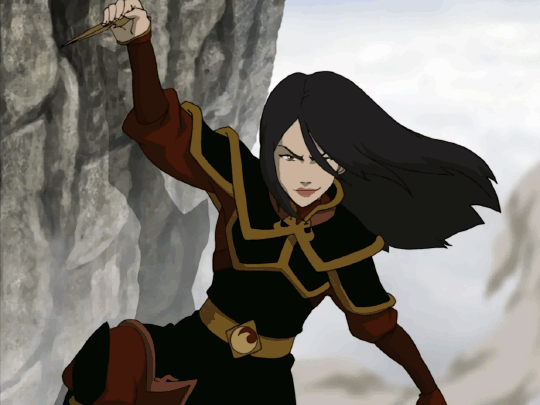
Azula (Avatar: The Last Airbender)
As @aspoonofsugar wrote recently on Azula, I think she is a fantastic female villain. I think she is sympathetic despite her actions, and I wish the story had explored her redemption, which was clearly hinted.
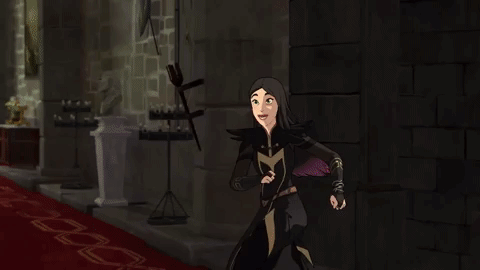
Claudia (The Dragon Prince)
The first three seasons have kind of been Claudia's fall. While as a whole I don't think TDP is very well-written, I do think that Claudia, Viren, and Soren's family dynamic is a polished gem of writing that literally carries the story. I fully expect to see redemption for Claudia down the line, but not until she spirals further and further. At the end of season 3, Claudia resorts to killing someone to save her father's life when she has nothing and no one else left, and she makes this choice after her brother Soren (now redeemed himself) chooses to kill their father in front of Claudia, devastating her. Their choices are clear parallels and both are somewhat negative, somewhat sympathetic. Soren can't kill his past: he has to live with it, and Claudia can't cling to the past: she has to let it go.

Delores Umbridge (Harry Potter)
She is awful and I hate her, but you're also supposed to hate her. Her comeuppance is hilarious ad perfect, and just--I think she's a fantastic villain because she reminds every single one of us of an albeit exaggerated version of a teacher we all know.
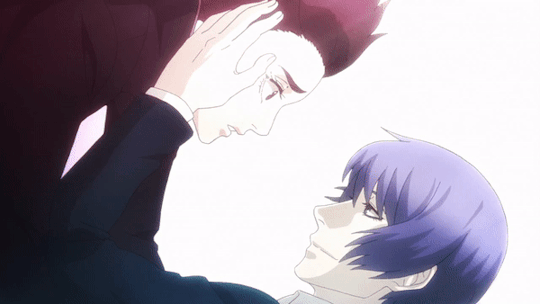
Karren von Rosewald (Tokyo Ghoul:re)
Karren is TG:re's best written character in my opinion. Her tragic arc takes place throughout the first three arcs, which imo is also the highest point in the series. Karren just wanted to be loved, and if she had to die, at least she got to die as herself.
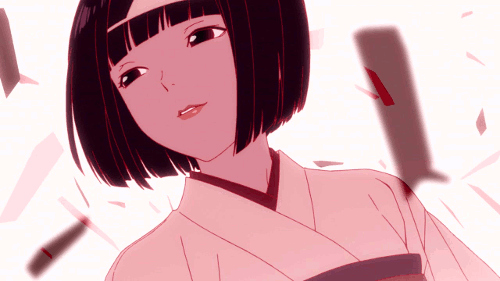
Nora (Noragami)
Nora! The reason I read Noragami is pretty much for Nora and her redemption arc. The fandom hates her for... reasons, but she's always been primed for redemption. Her name is in the title (which yes also refers to Yato, etc.) She's important. I wrote a few metas on Nora, notably here.
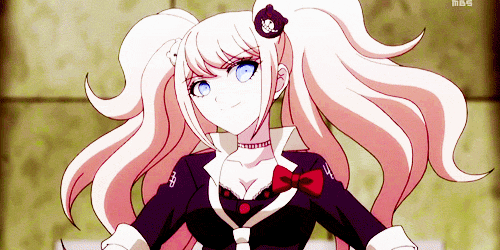
Enoshima Junko (Danganronpa)
Despair. It's fun to find a character who is, well, just plain fun, but who is also bored, despairing, cruel, and terrifying. She's unique and a brillaint character.
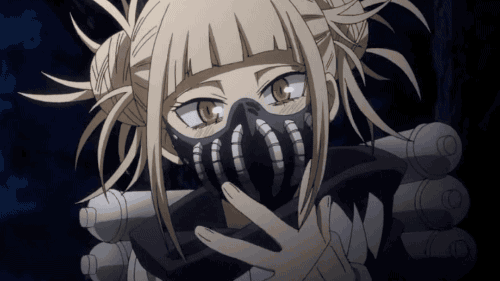
Toga Himiko (Boku no Hero Academia)
I'm not the first one to say that Toga is BNHA's best written female character, but I do agree that she is. She, like Junko, is fun and interesting, and she has an arc that is compelling. Her actions directly move the plot; she’s bloodthirsty and yet uniquely empathetic and compassionate.
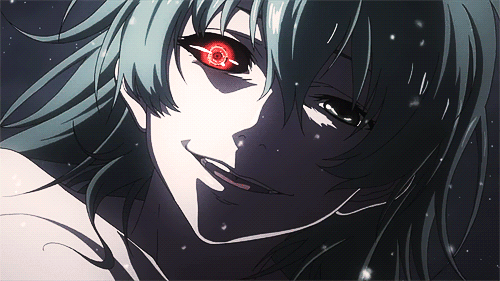
Yoshimura Eto (Tokyo Ghoul)
Eto's backstory and her motivations were fascinating. She was one of the most complex characters in the entire story, and despite the fact that you understood why her father gave her up, you also understood her pain and justified anger at his doing so. She perfectly illustrated the divide between human and ghoul.
Male Villains:
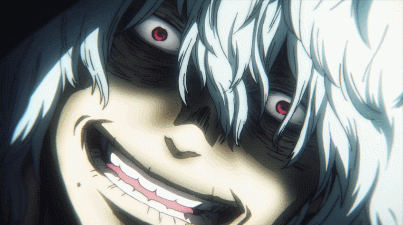
Shigaraki Tomura (Boku no Hero Academia)
BNHA's best-written male character, imo. His backstory and the current chapters that focus on him are extremely well-done, thematic and full of character development, and detailed artistically. He gets so much focus that I can tell he's important to Horikoshi, and I'm excited to see where he goes.

Dabi (Boku no Hero Academia)
I'll admit there's a lot missing here. Namely, we don't know his identity for certain, but it seems basically certain that he's Todoroki Touya; however, we still don't have his backstory. Still, his fury at the presumed father who destroyed his family and yet has the audacity to be a "symbol of hope" is fascinating to me, and I'm excited to see how he develops as well. (Both Shigaraki and Dabi seem primed for some kind of redemption).
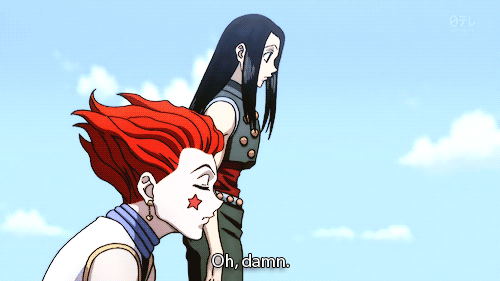
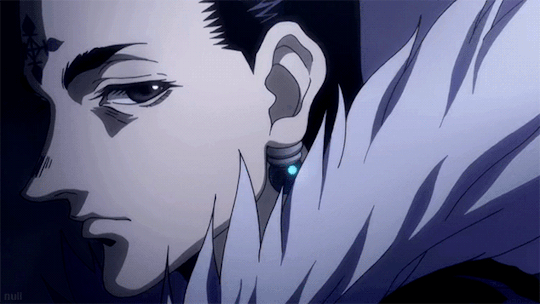
Adult Trio: Illumi Zoldyck, Hisoka Morow, Chrollo Lucilfer (Hunter x Hunter)
Am I counting these three as one so that I can get extra characters? Of course I am. In all honesty I really think all three of these antagonists are really well done, sympathetic and/or likable. They're the shadows of the three MCs they foil: for Illumi, Killua, for Hisoka, Gon, and for Chrollo, Kurapika. They represent the traits the three protagonists (sorry Leorio) don't want to acknowledge in themselves, and therefore their encounters with their shadows are particularly thematic and powerful. Also, one doesn't usually kill their shadow, but instead integrates with it, so I highly doubt the three of them will be killed by their respective protagonist.

Meruem (Hunter x Hunter)
Yes, again, HxH. It has great antagonists. But Meruem's development is literally one of the most powerful I've ever read about. I don't know anyone who starts his story not loathing him, hoping he dies, and then by the end of it, ebfore you've even realized it's happening, you're crying for him and Komugi. His arc explores human nature at its finest, most horrific, and ultimately most beautiful.

Furuta Nimura (Tokyo Ghoul:re)
Furuta's a fantastic villain whom I wish got a better ending (not even redeemed really, but just... something more). He was so damaged by the system of an unfair world that he made it his life goal to become the villain and burn the system down, destroy it no matter what it took--and also hoped to destroy himself in the process, as he was born knowing he would die young and longed for it. I wish he had been forced to live.
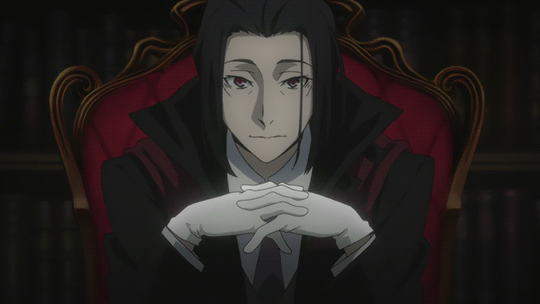
Mori Ougai (Bungo Stray Dogs)
Mori's utilitarianism is chilling. He's not exactly unlikable, despite being absolutely morally repugnant, and the Beast AU from Asagiri himself shows us that Mori is certainly capable of a positive life and positive change; however, within the canonical story, I don't see that for him. He's been set up IMO as the final boss of the series, and his habit of targeting the most vulnerable (especially children) to control people is almost certainly going to bite Dazai in the ass eventually.

Eren Jaeger (Shingeki no Kyojin)
I can't believe I'm writing this. I don't know what to call Eren: he's the protagonist, and he's sunk to becoming the final boss. While it's possible he, like Furuta and like Lelouch of Code Geass, is playing the villain, I really hope not, as I think the themes are much more powerful if Eren sincerely believes what he proclaims to believe. He's a kid who has always wanted to fight for freedom and for the people around him, and now we're seeing the dark side of those traits, wherein he's destroying the world via genocide to save the people close to him. He's driven by fear and by anger at the cruelty and unfairness of the world, and he's forgotten the beauty of it. I hope Mikasa can remind him before the end.
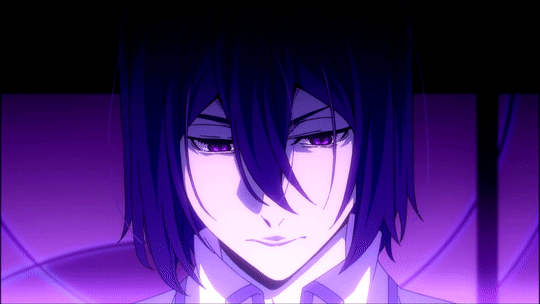
Fyodor Dostoyevsky (Bungo Stray Dogs)
MY BOY. Look if a character is named after my very favorite real-life author, I must stan. But actually I do think Fyodor is well written and a master manipulator. He's modeled after my favorite character in all of fiction, Dostoyesvky's Demons' Alexei Kirillov. He really seems to want human connection, to live, and has forgotten that empathy is an important and necessary part of both of those. I hope--and think it is likely given BSD's prolific redemption arcs--that he will remember eventually.

Lee Yut-Lung (Banana Fish)
Again,, he's less a villain than an antagonist. Like Ash, the main character, he is a teenage boy betrayed by the people who were supposed to protect him and abused his whole entire life. He's driven by a desperate need to be loved and jealousy that Ash is loved while he is not. His ending, when Sing finally tells him he will in fact be staying by Yut-Lung's side and will help Yut-Lung redeem himself, "because you're in pain... your soul's bleeding, even now" is literally the perfect ending for him.
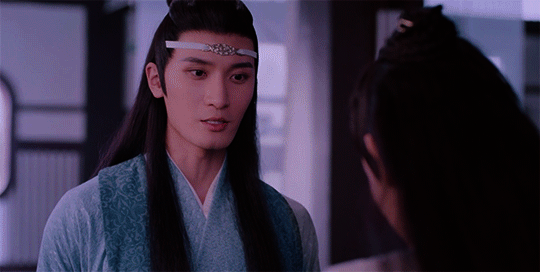
Jin Guangyao (Mo Dao Zu Shi)
I've written a lot on Jin Guangyao, but he's a walking tragedy. He ties with Wei Wuxian, the protagonist, as my favorite, and the reason is because they are two sides of the same coin--in fact, they're the same side of the same coin. They're not very different, and the fact that he finally at least got empathy in the end and was able to push the person he loved most to safety because of that--well. Brb time to cry.
65 notes
·
View notes
Text
Don’t Judge A Book By Its Cover
Pairings: Pre-romantic Prinxiety, brothers!analogicality Word Count: 1535 Rating: General Audiences Summary: Roman works at the Disney store when a shady looking person walks in.
Read on AO3 Here!
Roman Prince loved his job. Sure, the work of retail could be especially tedious at times, but at the end of the day, it was worth it. As long as he could see the young children coming in, eyes full of stars, as they tried to comprehend the overload of Disney paraphernalia staring back at them. How they would jump up and down, tugging at their parent’s sleeve before running towards something that caught their attention. How their older siblings, usually teenagers, would pretend to act cool or annoyed since they were ‘too old for this stuff’, but even they would let their inner child shine through as they perused through the racks. Sometimes they even got adults, never letting the Disney spirit die, excited to shop for themselves. No matter how old you got, everyone could relate to the excitement Disney lit in your soul. Well… almost everyone.
It was his turn to stock shelves, not that Roman minded. He was mostly left to his own devices, singing along with the music playing overhead, but sometimes a lost child or confused parent would ask him for the location of specific items.
“Thank you!” A charming young girl gushed at him as he handed her something from the top shelf.
“Of course, princess! Have a magical day!” Roman smiled, waving goodbye. He turned to return to his work, and that’s when he saw him.
Really, Roman wasn’t sure how he didn’t notice him walk in. The boy stood out like a sore thumb. Between all of the colors and happiness, he seemed to exude angst, wearing all black, like some sort of… emo nightmare. It was a punk, bad boy look. He would’ve been described as attractive by some. Roman couldn’t help but be suspicious, watching the other’s moves like a hawk. He knows he shouldn’t judge a book by its cover, Beauty and the Beast taught him that, but something about him was giving Roman a feeling he couldn’t quite shake.
He subtly watched him look around as if he were searching for something. He picked up a Lion King t-shirt, surveying it before placing it back down. His eyes, a deep brown, almost black, scanned his surroundings. His hair was dyed purple, and an eyebrow piercing glinted in the store lighting. Paired with his ripped black skinny jeans, studded leather jacket, and steel-toed combat boots, he seemed to be the depiction of ‘troublemaker’. Maybe he was trying to steal something? There was no other obvious explanation to his shifty demeanor.
Roman tried to focus back on his task while glancing at the hypothetical thief every few seconds. However, he must’ve not been as observant as he thought, as he nearly jumped out of his skin when someone cleared their throat behind him. He bit back a string of profanities when he realized it was the boy he had been watching earlier.
He mustered up his customer service smile, the one he used when he was dealing with a dragon witch of a Karen that demanded to speak with his manager, and in his best false cheer said, “Hello! Do you need any help?”
The emo raised an eyebrow unimpressed, “No, I just wanted to get your attention for the hell of it,” he snarked.
Roman immediately dropped the niceties. “You know, Hot Topic is just three stores down,” he gave him a once over, “they’re probably a bit more your style.”
“I have eyes, I can see where I am,” the other shot back. “I was just wondering if you had any Black Cauldron merch in here.”
Roman blinked, trying to process his question for a count of three before shaking his head slowly, “No, we don’t.”
He scoffed, “Figures, it’s one of the most underrated Disney movies of all time, even if it is the best.”
“Yeah,” Roman nods, “it’s a shame it doesn’t have a bigger fanbase.”
Out of nowhere, two boys, twins, Roman realized, sporting matching glasses, appeared. One attacked the emo’s middle and the other let out a long, sufferable sigh at the action. He took that as his cue to resume his restocking, involuntarily listening in to their conversation.
“Virgie! Look! I found the Winnie the Pooh stuffie! And Lo-Lo got a Baymax one!” one exclaimed. He was the complete opposite of his- older brother, presumably- dressed in a soft, pastel sweatshirt and a knee-length skirt. He pushed the stuffed bear up for him to see.
“Virgil can see that, Pat,” his twin stated. Despite the fact of being so little, he wore a collared shirt and blue necktie, like a mini businessman, though there was a light of excitement in his eyes too as he hugged his own plushie.
Virgil laughed lightly, “Patton’s just excited, let him be, Logan,” he ruffled Patton’s hair as he continued. “And it’s great, Pat. Are you both happy with what you found?” The twins nodded enthusiastically.
“Did you find what you wanted?” Lo asked, both looking up at their brother with large, expecting eyes.
“Uh, no, no Black Cauldron stuff here,” he replied, a hint of disappointment in his voice.
Patton’s shoulders slumped, “No Gurgi or Hen Wen?” he asked, sounding so upset, as if he was the one who longed for the merch instead of his brother.
Roman felt his heart drop, he did take this job to see the smiles of kids- and the discounted Disney items- but mostly the smiles.
“It’s alright, kid,” Virgil gave him a half-hearted smile. “I’ll just get something else. Maybe a Nightmare Before Christmas poster.” Patton, however, seemed unconvinced.
Roman could sense Virgil’s gaze on the wall of posters behind him. He subtly tried to follow his gaze and saw it land on the matching posters of Jack Skellington and Sally. They were limited edition, Virgil obviously had good taste. All of the posters were almost sold out, the shelf where they had been, empty. Roman had managed to nab the last one, placing it in one of his boxes to purchase once he got off of work. Was it fair? Not really. But he had wanted them really bad! They would look perfect on his wall!
Virgil chuckled humorlessly to himself, patting the space where the item would have been. “Or not.” Patton looked as if he was about to cry, clinging to Virgil’s legs. Even Logan looked mildly upset by the outcome.
At that moment, Roman realized he had royally messed up. Virgil wasn’t trying to cause trouble. He, like most everyone else, grew up with Disney and was sharing the magic with his younger brothers. He should’ve known better than to judge him by appearance. Disney was never wrong in their teachings. He made the split-second decision to help make the twins smile, and perhaps even give a proper apology to Virgil.
“I’d hate to interrupt,” Roman started, ignoring the questioning look Virgil sent him, as he crouched down to address Patton. “But did you say you liked Gurgi?”
Patton looked at him with his big sad eyes, sniffling before nodding.
“Well, we don’t have any Gurgi plushies, but,” Roman pretended to tap his chin thoughtfully before brightening as if an idea had struck him. He searched through one of the boxes he had still yet to stock, and in his, rusty, but decent Gurgi impression he said, “Munchings and crunchings in here somewhere.” This got a small giggle out of Patton, even his twin seemed to brighten at the quote. They both tried to peer over Roman’s shoulder to see what he was getting, but he blocked the view.
He grabbed the poster he had put away for safekeeping. He supposed there would always be new posters he could buy later on. He dramatically turned on his heel in his crouched position. He pulled the rolled tube into view as if he were unsheathing a sword and held it out to the twins with both hands.
Patton gasped in delight before looking down a bit confused, his enthusiasm ever-present. Logan, however, smiled in recognition. “Virge, it’s the poster!”
Roman looked up to meet Virgil’s eyes with a small smile, standing up and offering it to him. “Lucky for you, it's the last one. Worthy for a dark and stormy knight like yourself.”
Virgil’s gaze softened considerably at Roman though he rolled his eyes, a smile tugging at his lips. “If I’m the knight who’s the prince?”
He opened his mouth to speak, about to gesture to the twins when Patton beat him to it. “He is, silly!”
Virgil and Roman both widened their eyes, fighting blushes, realizing the implications of the statement. Virgil wouldn’t meet Roman’s eyes as the employee tried to remedy the situation. “I- I mean, I won’t deny that I’m a prince, but I was talking about you little princes right in front of me.”
Patton and Logan both grinned at that, as Virgil cleared his throat. “We should get going, Mom will be calling soon,” he said, rounding up his brothers and pushing them to the direction of the checkout lines. He looked over his shoulder, sending Roman a crooked smirk. “Thanks for the posters, Princey.”
Roman swore his heart skipped a beat. “You’re welcome.”
Taglist: @starry-knight-skies @space-captain-lars @viana-dascolli @wistful-wish
#prinxiety#pre-romantic prinxiety#brothers!analogicality#twins!logicality#older brother virgil#older sibling Virgil#sanders sides au#sanders sides fanfiction#sanders sides fic#sanders sides#ts sides#roman sanders#virgil sanders#logan sanders#patton sanders#ts creativity#ts anxiety#ts logic#ts morality#fanfiction#kay writes
92 notes
·
View notes
Text
100. procession of the dead,by d b shan
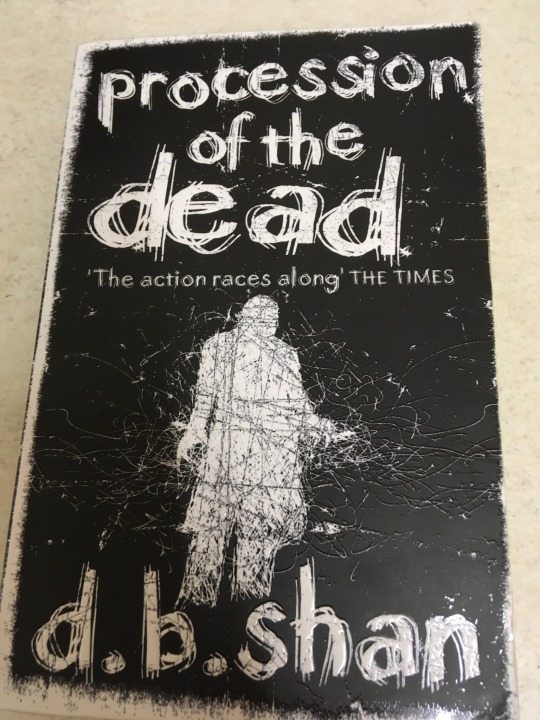
Owned?: Yes Page count: 312 My summary: There is only one man who has any power in the City. His name is the Cardinal, and you do not fuck with the Cardinal. He can make and destroy you, he owns everything, governments bow to his whim. And Capac Raimi, a young man who wants to be a gangster, is thrust headfirst into the Cardinal’s world when he sees promise in him. But this draws him into a greater mystery. Who is the Cardinal? Where does his power come from? And why is he testing Capac? My rating: 4/5 My commentary:
Time for something a little different, and this one has a bit of a backstory. D B Shan is the penname for Darren O'Shaughnessy, more commonly known as horror writer Darren Shan. His most famous series were the Circque du Freak and Demonata series, both aimed at teen audiences, and both series that I read and enjoyed as a kid (tl;dr, Cirque is good but the Demonata is great). This is the first of Shan’s first series for adults, originally published in 1999 then revised in 2008. I read this...presumably not long after it came out in 2008, since it was long enough ago that I didn’t remember a lot about it. Shan is one of my favourite horror authors, but how does his adult writing stack up against his teen horror?
Well, let’s talk about adult fiction. I sometimes find with adult horror that there’s an overreliance on gratuitous gore and sex, and this is particularly prevalent when children’s authors transfer to adult fiction. This isn’t really the case here. In fact, the Demonata is far more reliant on gore and shock horror than this. I saw one kind of gratuitous sex scene, and a smattering of gore, and that was it. It’s notable by comparison to the much bloodier, much more fucked up teen fiction Shan’s written. Instead, the horror here comes from issues of identity, not knowing who you are, being controlled by something you can’t see or explain, and the horror of everyone around you forgetting someone you love. It’s effective! Not to say, however, that this book isn’t its own kind of grisly - there’s murder and torture and such, but I keep thinking about the start of the first Demonata book where a teenage girl’s skin is used as a puppet by monsters and...this just doesn’t compare.
Capac Raimi is the first-person protagonist of this book, and he’s a fair enough antihero. I did, however, think he got a bit grating as time went on. See, while things definitely go wrong for Capac, he’s also narratively untouchable. He always seems to have a way around every situation, he always knows what to do and say and people bend to his will constantly. He’s not particularly compelling - sure, the conflict between his morals and gangster lifestyle is interesting, but there’s not really anything new there. That said, however, I think the book does work as a whole to show Capac’s descent into being a monster, starting out as chaotic neutral at worst and devolving into pure cold-hearted bastardry. I just feel like more time could have been spent on this, and the moment where he crosses the line into being irredeemable could have been handled better. As is, it just comes a little out of nowhere.
This wouldn’t be so much of an issue were it not for the fact that none of the side characters are really seen in-depth enough to be really interesting. The only character other than Capac given a decent amount of time is the Cardinal. But Capac’s lover Ama, his friend Adrien, his mentors Y Tse and Leonora...none of them really seemed much more than a one-note bit part, and that was a shame, because I liked their characters in concept. There was just so much going on that we didn’t see enough about them.
Then there’s the fact that throughout, women and minorities are treated horribly. The only black character is a serial killer, most of the women are defined by their sexuality or relationship to men, there’s a Jewish character who shows up to be tortured by Capac in a way reminiscent of the Holocaust...like, Capac’s not a good person and this book is about a criminal underworld, but it was notable that every time a character in a minority showed up, they were either terrible or had something terrible happen to them.
And yet, I found myself intrigued by the whole premise. Capac’s quest to find out what is going on with the Cardinal and the City, who he is, and why people are disappearing is a compelling mystery. I found myself not wanting to put the book down. The themes of personal identity and morality are compelling, and the supernatural element is both creepy and interesting. It’s a grim story, to be sure, but it’s an interesting one, with enough levity that it wasn’t overly depressing.
I had a good time, overall. I’ve actually tracked down copies of the second and third books, so I can see what happens next - I think I read them way back when? I’m just interested to see where this goes.
2 notes
·
View notes
Text
His Dark Materials at the National Theatre
There’s no publicly available video* of the National Theatre production of His Dark Materials, but the script is pretty easy to find, as Nick Hern Books released it.
They condensed the three books into one two-part play - the same style as Cursed Child. Two plays, so four acts, with regular intervals and a prolonged break between the second and third acts.
Under the cut, I’ve got some general information about the show, and a list of notes about changes, as well as anything I’ve found interesting as I’ve been reading. At some point, I may do a full summary of what actually happens in the script, rather than contrasting it with the books.
If you have any questions about the script, I’m happy to answer!
* Unless you go to the NT archive in London, and you can watch it there, but as it’s an archive copy, it’s apparently pretty mediocre quality, so more of a reference for the staging than an actual viewing experience. And you can’t watch it unless you’re in the actual building.
For general staging and information:
The National Theatre has a drum revolve, and most shows use it when staged there. As His Dark Materials was specifically written for that theatre, the revolve is used very liberally throughout, and an example of its use can be seen here
A handful of photos can be found here, and lower quality ones can be found from a bit of a hunt online.
Lists of both casts can be found here.
National Theatre Archive pages for part 1 and part 2
Act One
Opens with Lyra and Will as adults on the bench in Oxford - their conversations don’t line up, but work in tandem, and Mrs Lonsdale appears towards the end to indicate they’re going back in time as a flashback - Will disappears, and Lyra is twelve again
Roger and Lyra only meet for the first time before the Retiring Room, and Roger goes with her, though he’s just a tagalong - Lyra still does everything of importance
Jopari is alive, and brought up by Asriel in the meeting - there’s no head
Billy's dæmon is Ratter and he takes the Tony role of being the severed child
Mrs Coulter openly wants Lyra working for the General Oblation Board, and wants to tell her about it after the cocktail party
"Lyra the liar!” is said by both Pan and Roger at different points
Lyra is picked up by the Gyptians who are already en route north - they go straight to Trollesund, and Ma Costa doesn’t appear at all
Lyra: "Haven't you got any self respect?" Iorek: "None."
Farder Coram and Serafina Pekkala are "long lost friend[s] of my [his] youth-time days", and they communicate sometimes still
Lyra sees Billy post-intercision in a Tartar camp and is kidnapped from there - rather than seeking him out
Lyra is grabbed to be intercised when she frees the severed dæmons, and the intercision begins because they want to shock Lyra into submission before Mrs Coulter arrives - she arrives just before the intercision
They make the human-dæmon bond visible in the intercision machine - presumably so that the audience knows what happens when we see it severed later
Mrs Coulter gets the Parent Reveal, and she claims that it was distress because of everything that happened before and during the trial that meant she couldn't look after Lyra, and that's when Lyra was taken away to Jordan
Serafina's first appearance is at the end of act one, when she rescues Lyra and Roger to take them to Svalbard
Mrs Coulter and the monkey have a wound in the same place from the spy fly
Act one ends with Mrs Coulter reaching and yelling for "Lyra!"
Act Two
also opens on the bench in Oxford, with Will recounting how he wound up in Ci’gazze, but goes back to Lyra and co in the balloon
Jopari gave the amber spyglass to Serafina, and she shows it to Lee - and shows him Dust
there is a bear in the script called “Stupid Bear”, and he keeps calling the Chief Bear “Sarge”
another bear is Disgruntled Bear, and he complains that Mrs Coulter is “making us cook our food”, and they all miss raw walrus
there isn’t a delay on Iorek arriving at Svalbard - he turns up with Roger not long after Lyra
Asriel: “I refuse to be preached at by a sanctimonious ten-year-old.” Lyra: “I’m twelve! I’m twelve!” Asriel: “Well, you would know.”
the witch is interrogated at Bolvangar - where Mrs Coulter is also told that the General Oblation Board has been closed down, its records expunged, and her Geneva bank account has been terminated
Mrs Coulter also tells Lord Asriel that she wants to stay in their world to find and protect Lyra from the Church
we see Asriel holding Salcilia - as though daemons don’t vanish when their humans die (which may just be so that they don’t have to make a daemon vanish onstage)
Lyra and Pan take Asriel’s explanation of “heads in one world, tails in another” to mean that Roger might be alive in another world, and that’s why they leave
Lyra’s secret name (ie Eve) is a Big Deal - with Mrs Coulter, the Church, and the witches
Ruta Skadi is intent on war, but she’s also intent on killing Jopari, taking that particular role from Juta Kamainen - however, there are multiple witches named in the script, none of whom have a name from the books, and none of whom are named onstage
Lyra on her parents: “Wasn’t it awful when they kissed like that?”
Lyra lists off friends they’ve made (”Iorek... Serafina... Mr Scoresby...”) and Pan matches with their daemons (”...Kaisa... Hester...”)
“Boys can’t cook.” “Well, this boy’s had to.” “In my world, servants do the cooking.” “In my world, the Coke is brown.” Lyra and Will get right to snarking at each other, and Ci’gazze Coke is green.
Lyra and Will exchange the alethiometer and the green writing case as a show of trust
Lord Boreal shows up to Will in the library while he is looking for papers on his father, gives him a cutting about the window his father left through, and steals the alethiometer while Will is distracted
Boreal steals the alethiometer because he assumes it’s the case with the letters in it
Part 1 ends with Will getting the knife, then a montage - the witches see the angels, Asriel appears in his fortress, Mrs Coulter is looking for Lyra, Will calls for his father, and Brother Jasper gives the President a piece of paper with “Lyra Belacqua’s secret name”
Act Three
Opens with a montage - Lyra and Pan running; the gap between the worlds, Asriel trying to convince Marisa to go with him, then Lyra holding Roger as he dies; Serafina addressing the witches; Lyra meeting Will; Mrs Coulter talking to the President; Will talking about his father to Lyra; Jopari and Lee Scoresby; the knife fight; Serafina and Ruta; the President summoning the Council after finding out Lyra’s secret name
in the next scene, it’s various clerics talking about Lyra being Eve as well as Asriel’s plans
Boreal: “I’ve asked my manservant to make up the guest room for you.” Mrs Coulter: “The guest room? Well, we mustn’t upset him. I must remember to rumple the sheets in the morning. You really are the most delightfully old-fashioned host.” MARISA
Boreal cultivates orchids
Marzipan becomes blackberries, told with Serafina and Farder Coram - and their son is born nine months later, after the blackberry incident, and dies soon after
Chevalier Tialys and Lady Salmakia are married in this - they’re introduced with her as his spouse
Mrs Coulter brings Giacomo Paradisi to the Spectres and has them eat his soul - Boreal is terrified; the children pickpocket Giacomo and tell Mrs Coulter where Lyra and Will went
Ruta Skadi says “I’ve seen those eyes before” about Will and it carries an awkward weight when she was in love with Jopari and is intent on killing him
Mrs Coulter uses the Spectres to kill Boreal, rather than poisoning him
we actually see the Spectres attack the witches, rather than just hearing about it - and Mrs Coulter tries to be nice to Lyra shortly before the murdering
Ruta Skadi calls for Yambe-Akka to take her before she kills herself - which is odd, as the witch that Serafina kills calls specifically for Serafina to kill her
a mid-act flash of Oxford - Lyra afraid she’d never wake up from the world of the dead, and Will remembering finding out that taking this journey was his mantle
Lord Asriel: “Her mother? Stuck in a cave? I don’t believe it. This is a woman who has her hair done twice a week at six in the morning.” I’m just going to question how Asriel knows this, assuming it isn’t decade-old knowledge.
Stelmaria: “You’d have killed her yourself, at Svalbard.” Lord Asriel: “No, I would not! I thought I’d have to kill her, for the sake of my experiment. When the boy walked in, I was vastly relieved and I let her go.”
Asriel decides to care about Lyra because he realises that’s where his enemy is focusing
Asriel appears in the fight at the cave, and there’s a brief and angry family reunion
Will shatters the knife because Lord Asriel tells him to think of his father - but in the cover of the fighting, pulls Lyra away
Act three ends with Lord Asriel yelling “Lyra! Lyra!”
Act Four
Opens in Asriel’s fortress, with him getting information from Tialys and Salmakia
Marisa and Asriel have a (very angry) conversation about how they’ve both grown to care for Lyra - Marisa, because Lyra somehow changed her; Asriel, because he’s finally clocked that she’s important and in danger (and is trying to manipulate Marisa because he wants the knife)
Rather than talking, the monkey makes stabbing gestures in the air to indicate the knife
it turns out Asriel did actually take Lyra away because “You were raving mad! You’d have throttled her in her cradle!”
Mrs Coulter: “Then you ignored her, you neglected her, year after yearm she had no decent company, no education...” they’re really just sat here going, “no, you’re the shittier parent!” and arguing for five full pages
The actor playing Pantalaimon appears as Lyra’s Death. That’s an actual, heartbreaking stage direction.
Tialys and Salmakia don’t go to the world of the dead - they report back to Asriel that Lyra and Will escaped
Brother Jasper: “Father President, let me speak. I have sinned. I had evil thoughts.” President: “You are not the first young man to have been corrupted by Mrs Coulter. Make up for it on the battlefield.”
Lyra and Will help the Authority to die, and he smiles the whole time
Mrs Coulter and Lord Asriel see Brother Jasper about to kill Lyra, and throw themselves onto him to drag him into the Abyss - somehow, it takes two people to do that, rather than just kicking him, but anyway, this is what happens when we cut out Metatron
Pan and Kirjava both appear as cats, but they’ve both settled, and there’s nothing indicating he changes into a pine marten over the course of the conversation
“On Midsummer night at midnight... and talk til dawn, just like now, as though we were together again. Because we will be.”
The final line is Lyra saying “The republic of heaven”, after which two clocks are heard striking. Lyra picks up Pan, and she and Will pass each other, and walk out of sight.
So the changes are pretty inevitable when they’re trying to condense 1000 pages into five hours. As with reading any script, it feels ridiculously fast paced - but when a brawl between bears is reduced to a few lines of sparse stage directions, of course it feels fast.
One change that I actually quite like is the exchange of the letters and the alethiometer. It makes it a bit more believable - there’s no need for Lyra to not recognise Boreal, and the slimy bastard is obviously going to be able to distract Will with information about his father, given that’s what Will is in the library searching for. Parts of The Subtle Knife honestly make Lyra out to be a bit of an idiot - making it a case of Will being forcibly distracted makes it a lot more understandable than “Lyra gets in a car with a stranger”. And it makes his determination to get the alethiometer back while he’s still bleeding all over the place make a bit more sense. But the initial exchange of letters and alethiometer is honestly quite sweet, and it’s something I’d actually really like to see in the series, if I’m honest.
As much as I hate Mary and the Mulefa being cut, I get it. That’d be a fucker to put onstage - and there’s already a ridiculous amount going on, so they do need to streamline somewhere. I know that it’s missing, but it doesn’t feel like it’s missing, as so much is going on anyway.
The removal of Metatron has me livid. I know that they needed to streamline, but they could have pushed Brother Jasper into the abyss, it wasn’t a two person effort. Come on. Come on.
The characterisation of Marisa is interesting, too - they start hammering in her switch to being uncharacteristically maternal fairly early, and the fact that they change it so that Lyra was pretty much stolen from her makes it somewhat believable that she’d make that switch so easily. It’s obviously something that has been changed so that it seems like a natural character progression, but it’s really damn weird.
But to summarise - a few good changes, a few that I don’t like but which I understand, and a few that I neither like nor understand. And that’s always going to happen with adaptations. If I do a full summary, I’ll link it here... providing I remember. And again, if you’re curious about anything from the script, I’m happy to answer, and if it’s something else about the play, I’m happy to try to find out.
20 notes
·
View notes
Text
pacers (1/?)
Summary: Remember to run in a straight line, and run as long as possible.
Author’s notes: I have 28 pages (and counting) of one particular Gran Torino & Shimura Nana backstory, and while I’m in the process of rewriting/editing/adding, I’m just gonna post the bits I’m proudest of. Sorahiko’s surname Falco, Nana’s Quirk: Fade Out, in addition to her pro hero name Flicker Vision are inspired by @thelennystorm‘s body of work.
1 - 2 - ?
.
.
.
“Who’s the kid,” says Sorahiko, glowering down at the wild mop of sunflower yellow hair poking out from behind Nana’s back. Kid is clearly hiding behind her, and Nana is clearly shielding him, because her next smile looks a little more toothy than it should be.
“Be nice,” she chides. “This is Yagi-kun! I’ve told you about him before, remember?”
“No.”
She doesn’t even miss a beat. “Well, your memory extends to your work schedule and all the places you can buy cheap taiyaki.” Nana snaps her fingers at Sorahiko. “Anyway, Yagi-kun is planning to apply to U.A., and he wants to join the hero course. I thought it wouldn’t hurt to give him a demonstration of what to expect!”
This explains why they’re meeting in a park in their hero gear. It’s Sunday morning. Sorahiko could still be asleep right now, but he’d gotten a late night text from Nana asking to meet in their hero-gear, and because he’d just come off-shift, his delirious brain had agreed.
“You want to spar? Here?” he demands. The park is the worst environment he can operate in, especially since there aren’t any convenient children’s equipment to climb into and kick off of. Nana’s put him on the spot in flat land. He’s going to yell at her so much later.
“You’ve got your boots, don’t you?” she shoots back. She ushers Yagi out from behind her. He’s a tall weed of a boy, hands and feet still too large for the rest of him, and a face that’s a little too gaunt. Sorahiko presumes Nana will be feeding him until the hollows of his eyes fill back out, so the intense blue of his irises aren’t so… intense. “Yagi-kun, sit on the bench. Time us for three minutes, okay?”
“A-ah, okay, oshishou…”
Oshishou? Sorahiko narrows his eyes at Nana, who startles at the incredibly respectful, incredibly suspicious term. Nana’s not a certified master of any craft, much less a teacher. She laughs after a second.
“Yagi-kun, maybe hold off on that, huh?”
The kid mutters his acquiescence, and Nana is bounding to where Sorahiko is, a good distance opposite of him. She clunks her two fists together like this is a boxing match. It probably is. Sorahiko’s going to have to launch himself at her, and then do some rapid footwork to avoid getting slammed in the stomach or head. And since she expects them to be done by three minutes, she’ll probably break out her Quirk like three times… and use One for All to finish.
He says goodbye to a painless Sunday.
“I would’ve liked the warning,” he tells her. He raises his fists, loosely curled, and tenses.
“What villain warns of an attack?”
Nana shifts her weight. Instinctively, Sorahiko mirrors her, and the familiar adrenaline rush surges through him and his ears, but he hears her shout “Let’s go!” just fine. Fine enough to immediately jet to the side from Nana’s charge forward, slinging profanity as he dodges her grab.
He takes another breath, gambles the oxygen away in an effort to return and land one kick. His heel smashes down; he’s aiming for her spine and expecting her to twist around it. And of course, now she chooses to tap into One for All, because she lets him hit her, like she’s proving a point. Nana’s point being: she’s completely unharmed.
Oh, she’s crouched in a crater now, but otherwise? Completely unharmed.
“Fuck,” he manages, seeing Nana lift her head and catch him with a gimlet eye. It’s the split second that grounds him—the panic of did she use it, did I just paralyze my best friend—and that’s when Shimura fucking Nana spins in her half-crouch, seizes his boot by the knee, and yanks. “Fuck!”
“Watch your fucking language!” she laughs as Sorahiko is flung over her head.
Just for that, he spitefully aims his next output of pressurized air in her face. Nana splutters.
At the end of three minutes, Sorahiko’s face gets mashed into the dirt, one arm twisted up behind him. At least she’s put him at an angle so he can say, rebelliously, “You suck.” Straddled across his back, her other hand scrunched in his hair, Nana laughs again. He can hear the kid yelling time, and the increasing volume of shoes thudding against the grass.
“Yield?”
“Yeah, I yield.”
She lets go of him and rolls off, eventually sitting up and tucking her legs under her. Too exhausted to follow, or even gripe about the kid anymore, Sorahiko stays face down on the ground. His victory is scuffing her clothes and swiping her hair-tie. She plucks the latter off his wrist and fixes her half-updo.
“Yagi-kun!” she cheers. “Come sit, come sit.” She pats the patch of grass in front of her; the kid awkwardly rearranges himself so he too is cross-legged. “So this is, ah... “
“Gran Torino,” he grunts, reluctantly turning his head to peer warily at the kid. Nana might be fine showing off her face and probably telling her name to some random adolescent, but Sorahiko likes his anonymity.
“Nice to meet you,” Yagi mumbles. He edges a little closer, and then a veritable torrent of words come spilling out of him. “Oshishou, that was amazing, the way you reacted so fast to that last axe-kick! Is it because you’re friends with Gran Torino? Is that how you became familiar to his pattern of movement? Or did you see it too?”
“What pattern,” Sorahiko demands.
Nana knuckles him in the ribs. “We’re good friends,” she says to Yagi. “The downside of me knowing Gran Torino is that he knows me too, so he can adjust on the fly.”
“Ah…” Yagi tents his fingers. “So you did let him hit you that first round?”
“Yep! You’re an astute young man, Yagi-kun.” Nana gently taps her fist against his shoulder. Sorahiko is confused and quite possibly concussed. Maybe that’s why she scheduled the spar; so he wouldn’t be too vocally opposed to this entire meeting. “I was born with the Quirk: Fade Out, but the Quirk that gives me this strength and durability—”
“Hey,” he interrupts, to no avail.
“That Quirk was given to me.”
“Given?” breathes Yagi.
“Flicker Vision,” says Sorahiko, aghast at her lack of subtlety. This is a civilian. This is a civilian brat. Has she lost her mind? How did this kid manage to latch onto Nana and land here, without being politely shaken off?
“Hush, you,” she tells him. She won’t even meet his eyes. “Yagi-kun, Gran Torino’s a great trainer for all his grumpiness. He helped me control this Quirk, One for All, within a week.”
Control. Yeah, that’s a great word for it. Nana has had One for All for two years, and she is still leery of its potency. From what she’s told him, she uses the bare minimum to boost her speed, strength, and durability. She keeps the embers banked, and doesn’t dare to fan them into flames.
“So cool,” the kid marvels.
“He is,” Nana agrees, setting off all kinds of mushy feelings fluttering around Sorahiko’s stomach. Her next words petrify those feelings stone cold. “He’s going to help me train you!”
“I am not.” He shoves himself up, stifling a groan at the familiar aches, and sits next to her. “I’m busy.”
“With what?”
“With… with…” Sorahiko struggles to come up with a decent excuse. It doesn’t help that they have an audience of one, tracking their banter like it’s a tennis match. Lesson one: there is no denying Shimura nee Chiratsuki Nana. There are only attempts at deflecting. “With adult stuff. I have a life outside hero work, you know.”
She frowns. “Since when?”
.
.
./cont?
#bnha#gran torino#shimura nana#shih.txt#pacers!fic#they are platonic soulmates in this one#but in the vast majority of my other 140+ pages#;)#torino sorahiko
13 notes
·
View notes
Text
Neverland, the role of “nostalgia” in Kiuzna’s narrative, and the 02 quartet’s unusual immunity to it
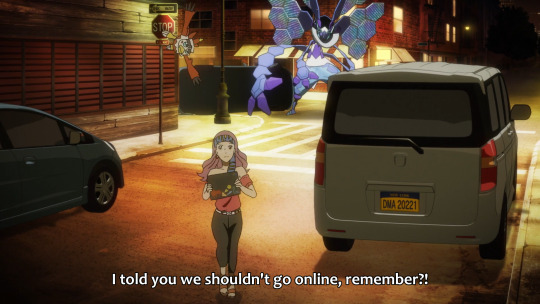
In general, the 02 quartet (my shorthand for the four human characters introduced in 02 who weren’t in Adventure, namely Daisuke, Ken, Miyako, and Iori) have a position in Kizuna that you can call “shockingly favorable” in that they’re kept safely out of the most dangerous parts of the plot in ways the others aren’t. This especially sticks out when we get to the Eosmon incident reaching its climax, when Takeru and Hikari are placed in the same situation as their Adventure seniors, despite the movie and its surrounding media generally portraying them closer in line with the others in the 02 group than the Adventure group.
To be a bit blunt about it, the obvious main reason the story is set up this way is meta -- a lot of the climax’s effectiveness depends on the audience getting sensory impact via recognizing things from the original series (including 02 as well; how convenient it is that all of the international Chosen are in the positions 02 fans would recognize!), and so it’s obvious that said climax would evoke imagery related to the series that was Digimon Adventure, while the 02 quartet would be treated extra-kindly by the narrative due to the need to give them compensatory action screentime given certain real-life events. But just because the originating reason is meta doesn’t mean there isn’t also a story reason for it, especially considering the relevance of 02′s themes in Kizuna’s narrative, and the surrounding circumstances regarding both series.
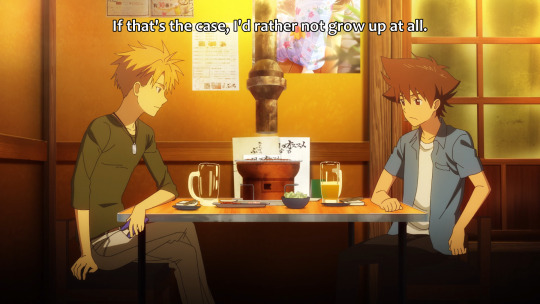
Before we get into anything else, the first thing that needs to be established is that Menoa and Eosmon’s lure is pretty obviously depicted as working on a subconscious level. This is why everyone else in the narrative agrees that what they did is “kidnapping”, despite her insistence that she’s just doing what they wanted. While they can’t not admit to having moments of weakness, nevertheless, it’s likely that most if not all of the people Menoa kidnapped consciously knew better and had learned better lessons than this a long time ago; if Menoa had consciously offered Neverland to her victims, most of them would have probably said no! But as Daisuke said back in 02 episode 49 -- when he witnessed his own friends being subjected to something similar at the hands of BelialVamdemon -- there’s no sin in having feelings of worries or troubles (and, by extension, irrational feelings in general), and Eosmon’s abilities and Neverland happen to be able to directly target them. In fact, we ourselves got to witness this internal conflict when Menoa made her direct offer to Taichi and Yamato to join Neverland; they briefly considered it because of the circumstances, but were snapped out of it quickly with Agumon and Gabumon’s intervention, and were really, really mad at themselves for considering it shortly after.
We saw the process of how Ayaka became one of the kidnapping victims at the beginning of the movie -- it happened right after she complained that she wasn’t fond of the idea of becoming an adult at this point. So it does lend some truth to the idea that Menoa’s working off something with these cases, and that Eosmon did specifically target people who had those wishes to some degree. Moreover, note carefully how this kidnapping (and some others in the movie) is portrayed; Eosmon doesn’t actually emerge from the device in question (it’s obvious that nobody notices the giant butterfly monster), and the victim’s consciousness and partner are whisked away thanks to being caught by the device camera. In Ayaka’s case, because her phone was sitting on the table, pointed at her. The fact that this is not how the kidnappings are portrayed all the way to the end of the movie is a very significant point.
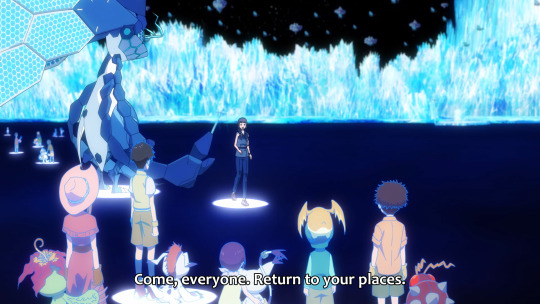
So let’s talk about Neverland and its construction. The whole thing is based on Menoa’s own very, very warped view of what “happiness” is. This means that Neverland is only an “ideal world” or “utopia” in a way that makes sense to her -- and once you learn the full extent of her backstory, it becomes apparent how she came to the mentality she did, and, more pertinently, how she ended up projecting that on everyone else. Hence, how she came to decide that she knew better and should decide for everyone, because she thinks she gets the right to decide on everyone’s happiness based on her own experiences. (She doesn’t.)
The way Neverland is constructed is that everyone has “their own places” -- their own individual islands that recreate “memories” of everyone being able to be together with their partner, forever. So in other words, it’s not just that everyone’s being turned into children; it’s that they’re being kept in an eternal loop of their best memory and unable to “move forward”.
Here are three very significant parts about this, which will be important to keep in mind as we go deeper into this analysis:
Menoa’s view of this utopia requires people to be separated -- for all she claims this is a utopia where people can play together, she discourages fraternizing and encourages everyone to stay only with their own partners. This is, presumably, to lessen complications with said memories, because what might be one person’s best memory might not be for another, and also because she thinks one person being alone with their partner is happiness enough in itself. As we’ll be seeing later, this is very much not the case for everyone.
A lot of these memories in Neverland -- and Menoa’s own mentality, as we eventually find out -- are heavily dependent on the concept of rose-colored nostalgia, or, that is to say, conveniently omitting or forgetting about all of the bad things about one’s past in order to portray it as such a wonderful thing that nobody should ever move on from. And in the end, that probably applies to real-life childhood in general, too; as much as it’s so often put on a pedestal for being a time when “everything was simpler”, you can also easily argue that it wasn’t actually all sunshine and roses, it’s just that the process of forgetting things or the grass-is-greener phenomenon makes you conveniently forget all of the bad things and frustration that came with it too.
Because the concept of needing to stay in the past forever is based on the idea that it’s preferable to growing up, these memories thus have a strong premise of “things you cannot do anymore” -- something that, bar going back to the past and never moving from it, you will never get back or be able to sufficiently recreate. It’s unlikely the islands themselves are one-to-one recreating their specific memories in the way they happened, but rather seemingly presenting them the opportunity to “constantly do over” things they want to recreate or do again, as long as those things are associated with a happy thing that isn’t as easily accessible anymore.
In the case of the five Adventure group members who were brought into Neverland, these “memories” that they’re seen trapped in are, of course, from Digimon Adventure.
It is of course foolhardy to pretend that the main reason for this wasn’t meta, since, of course, there’s a huge point to be made here about the relationship between Adventure and nostalgia, plus the simple fact that this is what we’re most likely to recognize and be nostalgic for, but it also makes sense within the context of the narrative; Menoa has an extreme bias towards the happiness of her childhood revolving almost entirely around her partner, and, of course, Adventure was when these kids first had their most formative meetings with said partners. (This is also probably the in-story explanation for why the other international Chosen from 02 appear at or close to their 02 selves; beyond the meta reason of it being a way to make them recognizable when we only knew them for such a short time, it also approximates when they met their own partners.)
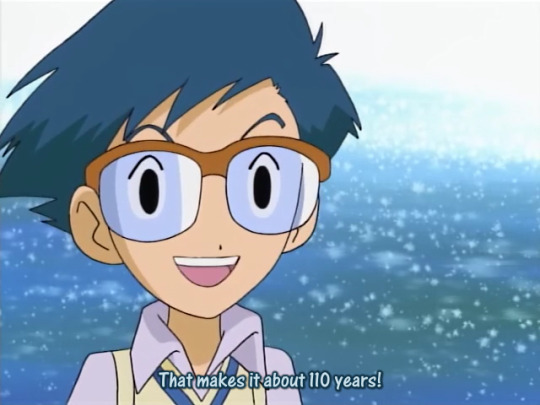
On top of that, Adventure was not all sunshine and roses for its cast! After all, there was a ton of drama and emotional trauma and stress from running away from enemies trying to kill them, or trying to save the universe, and glossing over that is also foolhardy -- but this is also where our concept of “rose-colored” comes in. Menoa’s not offering the kids the entire adventure; she’s offering them a small slice of the moments when they were able to be happy, the moments that made them want to stay in the Digital World for a whole 110 years’ worth of time at the end of Adventure -- she’s basically offering them that very thing they wanted and had ripped away from them at the end of Adventure when the time dilation phenomenon stopped. Take out all of the bad stuff, and suddenly, the events of Adventure seem outright romantic -- it’s the whole school of thought that fueled Adventure’s inspirations of Two Years’ Vacation and Stand By Me, in which a lot of stressful stuff happened and yet you still can’t help but think there was something magical and romantic about it. (I cannot emphasize enough how much of a cultural impact Stand By Me in particular had in Japan, to the point where it’s considered the epitome example of a “coming of age story” and “summer adventure”.)
Let’s take a closer look at what’s on each of the Adventure kids’ personal islands:
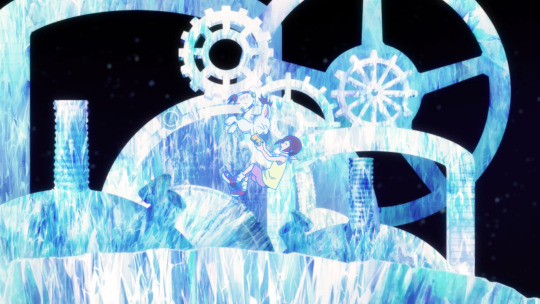
Hikari is probably the one in the most unusual position among this group, since she didn’t join until over the halfway point, and the first arc she got involved in revolved around everyone wanting her and Tailmon dead. Thus, the memory we get to see her involved in is the Numemon factory in Adventure episode 49. Although this was in the middle of the Dark Masters arc (and, uniquely, very close to the end of the series where a lot of stress was involved), due to the limited amount of time she got to be in the Digital World, this was the one time she got to do something really cool and awesome and impressive for herself that had nothing to do with the others (again: see how the requirements for these islands require not fraternizing with friends and being isolated).
One thing that the Adventure kids got to do that wasn’t in play in 02 was that there were a lot of “romantic experiences”, involving strange adventures and things like phone boxes on the beach, and, very significantly, “Digimon friends” -- ones that the kids made a huge note of bonding with over the course of the series. This contributes to a certain sense of whimsy that was involved in this adventure that the 02 quartet ultimately never ended up getting to foster, because the lack of the time dilation phenomenon meant that they spent much less time in the Digital World overall (more on this in a bit), and once the time dilation stopped, it meant that these kinds of “whimsical” experiences were ones the Adventure group was permanently torn away from once that adventure ended. That dropping of the time dilation phenomenon not only cut that initial adventure short, it also prevented any future ones like it from ever happening again.
And, of course, this is an extremely rose-colored memory, because shortly afterwards, the Numemon ended up all sacrificing themselves for Hikari. But hey, when you’re in a space that can eternally loop good memories forever, everything’s fine as long as we conveniently never get to that part, right?
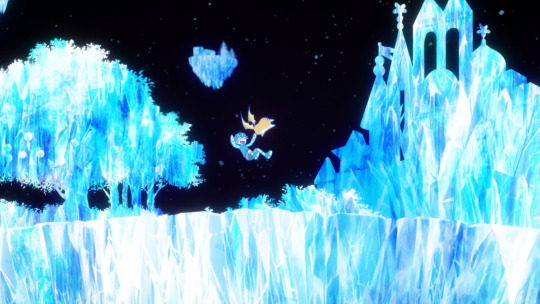
From this point on, you’ll notice that all of the memories that show up on these islands are from before the halfway point of the series, because after that, things started getting increasingly pear-shaped and much more difficult to disentangle the stress, mental breakdowns, and witnessing of deaths from. (Hikari’s probably wouldn’t have come from such a late incident if she hadn’t joined the party so late.) Although there still were looming threats around the horizon in the beginning of Adventure, they weren’t always immediately apparent to the kids at every turn, and in fact, the beginning of the series involved more of a “well, we’re in this situation and probably need to get home somehow” aura than it did a “the world is in danger and all of us might die” aura. (It’s also in direct contrast to the 02 group, who were given the details of the crisis and what they needed to do roughly from the get-go.) So in other words, if you want to have some rose-colored nostalgia about the romanticism of this adventure, these are some of the best episodes to pull from.
Takeru’s is obviously from the Village of Beginnings, corresponding to Adventure episode 12, when he and Patamon got to have a fun romp through the village, play together, meet Elecmon, and learn about how Digimon are born. It’s also very much something he did without the others, only with Patamon, and had a lot of “fun and happiness” associated with (later solo episodes with Takeru had a lot more upsetting events more intrinsically tied with it), and, again, it’s extremely rose-colored -- it wasn’t even a day later when Angemon died in front of Takeru’s eyes. But hey, that’s even more reason to pick a moment from before then to stay in forever! Can’t have trauma if that trauma never happens, right?
Also, note that Takeru is one of the few here who’s confirmed to be aware of the partnership dissolution issue at this point, and, unlike Koushirou, isn’t confirmed to have accepted a forward-thinking mentality about it yet -- this is a very, very prime time for his fears of being separated from Patamon again to have a nasty relapse.
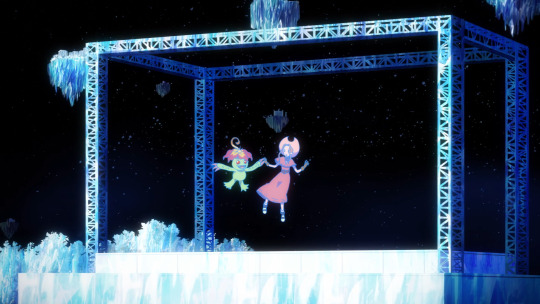
Mimi’s is the closest to the midpoint of the series, from the affair with the Geckomon and Otamamon castle (from Adventure episode 25; the metal railings here resemble the stage railings from that episode). It’s from the period of time that was a “lull” -- when nobody actually knew about the encroaching threat of Vamdemon quite yet, and for all it was worth, there was no longer any danger. So Mimi got to live happily in the comfort of the castle and play around with the Geckomon and Otamamon...which, of course, also conveniently excludes the affair where she went on a power trip, made everyone miserable due to her selfishness, and immediately felt guilt over it.
Mimi’s associations with this incident are not entirely negative; she was clearly still having fun singing for them in the end (note how her clothing during that scene involved her regular outfit, which she has on here), and she still had a positive impression of her relationship with the Geckomon and Otamamon as per Adventure episode 47 and 02 episode 6 (and as per 02 episode 15, even though everyone’s initial encounter with TonosamaGeckomon ended badly, nobody actually has any lingering grudge against him). So if you filter out that whole affair with the power trip and the resulting embarrassment, it was a meeting with a bunch of fun Digimon friends, a romantic little castle, and a fun stage session where Mimi got to sing.
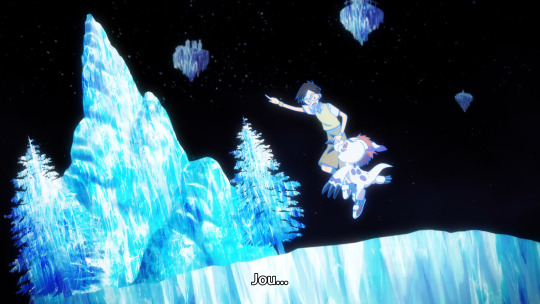
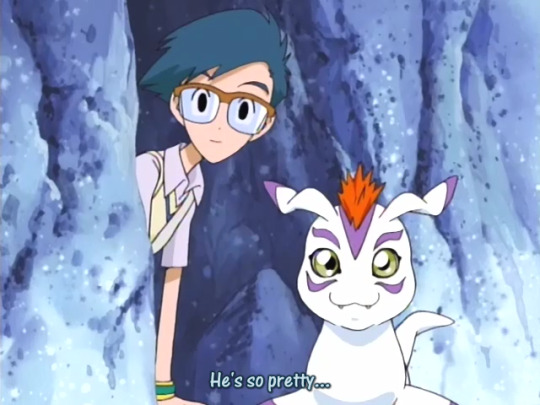
Jou’s refers to the Infinity Mountain incident in Adventure episode 7, and even from the get-go you can already see the level of rose-coloredness in Jou’s gesture -- in the actual incident depicted, Jou went to the mountain out of a sense of obligation and stress, and the initial climbing involved him having a bit of a bickering moment with Gomamon. But once they did get up there, it was actually their first time the two of them got to really “bond” -- and not only that, their encounter with Unimon had Jou even look on it with fascination, before the Dark Gear had ever come into play.
So in the end, Jou really would have found the incident enjoyable and worthwhile if not for that, and from there you can understand why it would be appealing for him to revisit that setting and finally get to have a bit of calm fun with Gomamon there -- especially since, again, the Neverland islands have a very strong preference for isolating the kids from others, and this was one of the few times Jou got to have a major moment of calm like this alone with Gomamon, with a slight reprieve from the constant feeling of stress and duty.
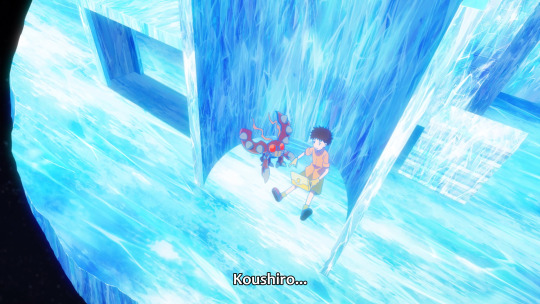
Koushirou’s most prominently resembles the “sealed room” in the factory in Adventure episode 5, and while Koushirou certainly continued to make a large number of exciting discoveries after that, this was the situation where Koushirou, with no one else but Tentomon to worry about in the immediate vicinity, got to have the largest sensation of “novelty” -- where he first came upon the fascinating discovery of data manipulating reality around him, and he actually got to see the world change around him by wiping things off a wall.
And, of course, there were other things going on like Tentomon confronting him with his first existential crisis, and how things quickly went south with Andromon...but we don’t have to remember that part for now, right?
An interesting thing about Koushirou: the circumstances of how he was “kidnapped” in the first place are actually somewhat obscured compared to the other four in this scene, since Menoa presumably needed him conscious in order to get his list out of him, resulting in his kidnapping scene also involving an emerging Eosmon and not having him be instantly taken the way we see Takeru and Hikari (more on this in the section below). It’s thus unclear whether he’d be in their boat had his position in Menoa’s plan not been unusual -- said memories in Neverland involved “gathering information and learning more”, something he still actively involved himself with even after the events of Adventure, and he’s also the first one to reach a forward-thinking mentality about the partnership dissolution phenomenon. Either way, once he was already dragged into Neverland, it’s natural that the place could find a good memory for him in the same way it did for the other kids who were “manually” dragged in, but the actual method of entry and whether Koushirou's post-Adventure life put him in a mindset similar to that of the 02 quartet (again, see below) is a bit ambiguous.
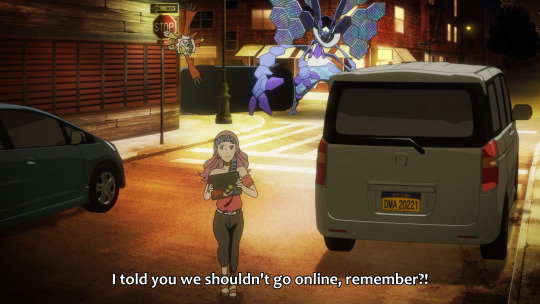
So here’s an interesting part about how the 02 quartet gets involved in this story: their own encounters with Eosmon happen during a part where the method of kidnapping has abruptly changed. As many have pointed out, this is also when the degree of the targets Menoa wanted had also suddenly escalated, because while her previous claims had involved the idea of kidnapping like-minded adults (who, indeed, were entertaining thoughts of nostalgia to even some degree), she was now kidnapping actual children, ones who weren’t even nearly at the point of the supposed drudgery of adulthood that Menoa claimed they would eventually have, and with her arrogantly deciding she knew better for all of them. The part that becomes particularly intriguing about this is that the exact same thing happens with Miyako -- she is explicitly stated to have connected her laptop to the Internet, resulting in an Eosmon physically emerging and chasing her instead of instantaneously snatching away her consciousness through a camera like her own fellow 02 group members Takeru and Hikari.
So in other words, the 02 quartet’s favorable position in this incident doesn’t just have to do with being lucky enough to have gotten Koushirou’s warning about the Eosmon early; they (or at least Miyako) also seem to have a certain degree of outright immunity to it, much like the young children who aren’t old enough to have nostalgia yet. (Also, keep in mind that Takeru was caught thanks to a security camera; “excess caution with electronic devices” alone wouldn’t necessarily have guaranteed their safety.)
Recalling that, for the most part, Takeru and Hikari are usually treated more like 02 group members in the context of this narrative yet are, in this one case, treated as being potentially nostalgia-prone, it stands to reason that the main difference between the two of them and their fellow members in the 02 group is the fact that Takeru and Hikari went on the adventure in 1999, and the quartet did not. So in other words, the reason the 02 quartet isn’t as prone to this is not so much that they’re fundamentally different-minded people, as much as they have a distinct lack of an experience they can be attached to the way the Adventure group is to their own 1999 adventure. (Remember that Menoa’s kidnappings work heavily on subconscious feelings; you can’t blame anyone for having these kinds of feelings no matter how much they’ve consciously learned.)
As I said earlier, it’s foolhardy to pretend that Adventure was all sunshine and roses, and, likewise, it’s also foolhardy to pretend that 02 was nothing but suffering for everyone involved. Both series involved a lot of balancing of funny, silly moments to be treasured as much as they involved stress (which is why people are so attached to both, after all). So the question is not so much how happy they were in their childhoods as much as the nature of what that happiness came from, and what relation it has to their current lives. And when you look at what experiences the 02 quartet had back in 02, you might notice a thread of the fact that it is significantly harder to romanticize the events of 02 than it is Adventure.
Let’s put it this way: Let’s say that the 02 quartet was kidnapped into Neverland and placed onto islands that fit Menoa’s view of happiness. What, exactly, would you pick from 02 itself that would work? What kind of “happiness” did they have back then that’s so romantic, so impossible to replicate now, that they’d want to go back to because it’s better than their lives now once you disentangle all of the bad stuff?
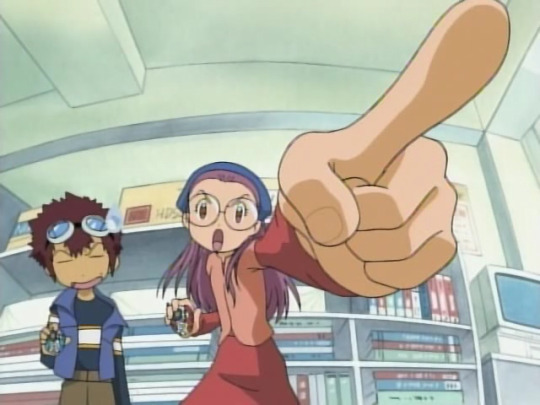
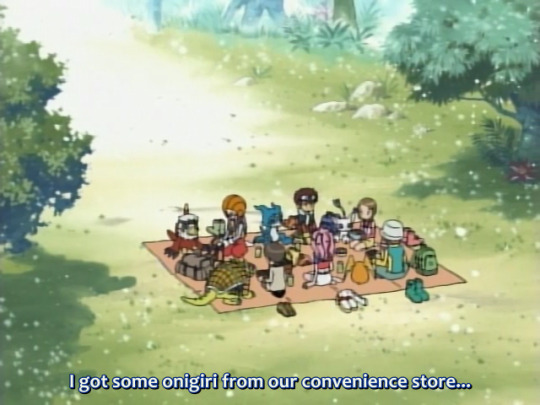
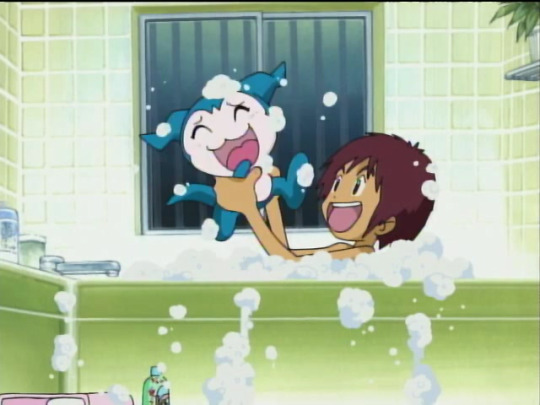
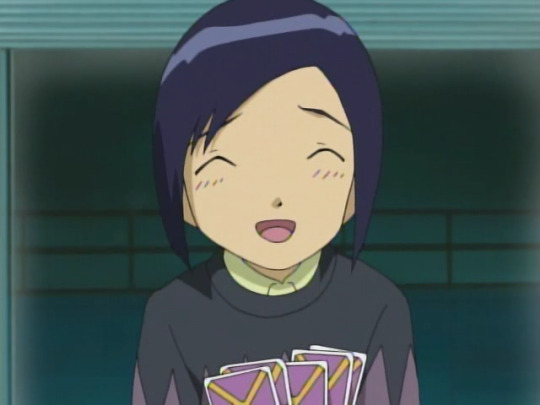
...Not much. Not much at all, actually. Hanging out in the computer room together? Doesn’t seem like they cared that much about the computer room part as much as the fact the others were there bantering with them (which would put a huge nail in Menoa’s islands mandating isolationism). Going out on a picnic together? No reason they can’t just go on another picnic again (and if the BD box is to be believed, that’s exactly what they did, and they even added Ken to it while they were at it). Hanging out with their Digimon in real life and doing silly hijinks? They’re...probably still doing that now, actually. Getting to find true happiness at a Christmas party? That’s a party from the real world (again, something they most certainly continued to do thereafter), one where the happiness came not from the romanticism of anything that happened to do with some adventure, but just the happiness of being surrounded by true friends, which, again, Ken is still clearly getting to do by the time of Kizuna.
Once you look at the circumstances of what the “adventure” of 02 was to the 02 group, you may realize that it doesn’t really resemble the traditional romantic image of an “adventure” much at all. Sure, they were blessed with being able to regularly go back and forth between the Digital World from the get-go, but it meant that -- especially without the time dilation in play -- the Digital World became much less of a picturesque area associated with a one-time memorable adventure as much as something they had to squeeze in their after-hours while juggling it with their school. The circumstances they encountered their Digimon and the Digital World in were at a point where it had a certain level of “mundane” to them, compared to their seniors; it wasn’t a “fantasy adventure in the Digital World” when so much of the story also revolved around real-world events as well, and you can’t really find many “mysterious fantasy” events in 02 that resemble much of those in Adventure. The closest might be...Daisuke seeing Numemon pile out of a vending machine in 02 episode 1? (Not very romantic.) Daisuke getting chased around by a Tortomon in 02 episode 22? (Really not very romantic.) Iori getting to tour the ocean with Submarimon? (Implied to more about relief from how much he was holding himself back than the uniqueness of the experience in itself.) Ken’s long-time-ago flashback from 02 episode 23 about meeting Wormmon for the first time? (Defeating a Gazimon is hardly that impressive; the important part was him bonding with Wormmon, which he’s...uh...still doing now?)
There weren’t any lasting relationships with Digimon friends like the ones in Adventure, maybe encountering some civilians once and not seeing them much again after that, especially since the lack of time dilation meant not getting to spend as much time visiting them much at all (think about all of the really fun experiences that the Adventure group probably had that weren’t shown in the actual Adventure TV series, just because it probably didn’t have enough drama that would make a good TV episode plot). This means that there’s very little, if at all, of 02 that represents something this group would want so badly to recreate that they can’t already do now; everything from back then was either something comparatively mundane, or something they actually would not want back. Unlike with Adventure, where a lot of the kids had irreplaceable moments that only happened to be spoiled a bit later, a lot of the “really awesome accomplishments” from the first half of 02 were explicitly against Ken, someone whom they’d probably rather not dwell on fighting again because of how much they love him now; many of those good memories are “retroactively poisoned” because of that, and it’s much, much more difficult to make a rose-colored version of those memories disentangled from the bad, because of how fundamentally intrinsic that retroactive poisoning becomes.
And, when you think about it, the mandate of “you have to be alone on your own island” would pretty much break these four in particular, especially since the 02 group is portrayed as the type to need mutual support more than anything else, and so many of the events that represent “happiness” specifically involved the happiness of each other being present. It’s not to say that the 02 quartet had no moments of happiness when alone with their partners, but, rather, being with each other provided so much more fulfillment to them that Menoa’s offer of a memory of their past that requires them to be alone probably pales in comparison to anything they could do now in each other’s presence. Maybe, like with the other kids depicted in these scenes, they could be buttered up with something nice if you successfully got them into Neverland, but it’s not like they have any real wistfulness about anything from back then to the point that they’d be subconsciously drawn towards it instead of having to be dragged in kicking and screaming -- and especially in the case of Miyako, the same one who managed to evade an Eosmon here, who was offered a similar “chance to be alone” back in 02 episode 49 and didn’t take very long to decide she hated it because of how much of her happiness comes from getting to be with others.
By the time of the end of Adventure, the Adventure kids’ ideal situation was to have a romantic and fun 110-year adventure with the sights and fun of the Digital World, with all of the weird fantasy surrealism and less of the world-saving, and that’s something they never got to have (and that Menoa was inherently offering them). By the time of the end of 02, the 02 quartet’s ideal situation was...to find a way to get back to normal life and hope their friend feels a little better, and that “ideal situation” is still persisting even into the time of Kizuna, so it’s hard to imagine they really want more than that.
And, again, when you extrapolate this into what Kizuna’s trying to say about real life, adulthood, and nostalgia: it is true that Menoa’s projecting a belief that absolutely does not apply to everyone. While it’s true that many people feel that childhood had a certain kind of magic that you can’t get back in adulthood, there are possibly just as many people who aren’t really all that nostalgic to begin with, either due to trauma or something about their childhoods being miserable, or, even in the lack of such miserable events, simply enjoying the added freedom and expanded range of ability that comes with adulthood to the point they consider it to be more than worth the tradeoff. The 02 group basically represents this crowd -- Ken’s life right now beats out his past in pretty much nearly every respect, and while there are certain concerns about not being able to meet up as often, they’re finding the same ways to do the same kinds of over-the-top hijinks they did back in 02, with arguably even more range now that they get to exploit Digital Gates to do world travel and act without worrying about their parents. They’re basically like the adults who see Menoa’s creed of “childhood is better because adulthood sucks” and go “sorry, can’t relate.”
That said, remember: this isn’t because the 02 quartet is somehow mentally stronger or anything, but rather just a byproduct of what experiences they've had and haven’t had. Takeru and Hikari’s position is unique here -- for all intents and purposes their mentalities are portrayed as closer to the 02 group’s, but they did still have the experience their seniors had and are thus still capable of being close to their position in this one regard. In the end, everyone is different, it’s no sin to have feelings based on those differences, and “being able to relate” to one’s position is also an important key here; because the 02 group’s position is so alien to Menoa’s, it’s unlikely they could have tackled her problems nearly as intimately as their seniors could.
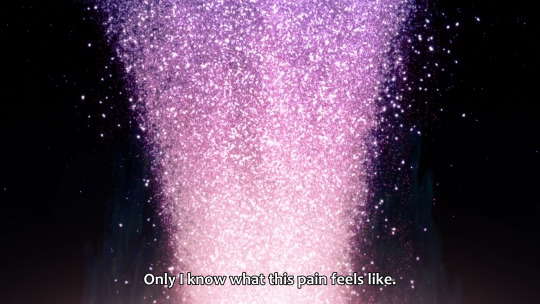
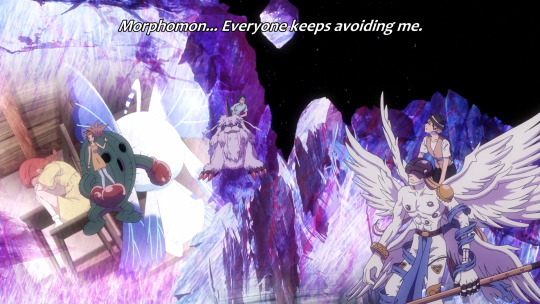
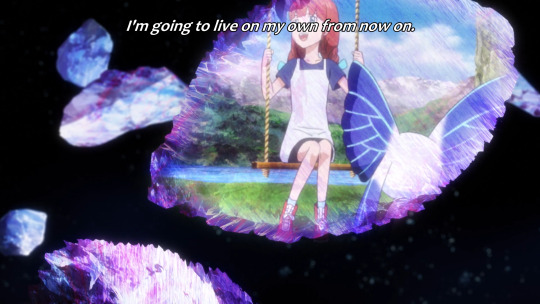
What we learn about Menoa’s backstory establishes that she forced her vision of nostalgic happiness on everyone based on her own perception of her past in such a warped, rose-colored manner. She conveniently omitted or forgot about details such as the fact that her life as a “child” involved feeling ostracized from everyone and that she herself was guilty of neglecting Morphomon. Not only that, she herself claims that she’s the only one who knows what this feels like -- that nobody relates to her -- and thus, you can see that she came to her conclusion that her experiences are universal by the power of sheer extrapolation, hence why she thinks everyone inevitably loses their partner upon reaching adulthood despite pretty significant amounts of evidence to the contrary. (For all it’s worth, the fact that she still considers herself as having “become an adult” at 14 just because she got into university at that time is pretty conceited.)
Menoa’s existence as being so starkly in contrast to the 02 quartet’s is very likely because her entire character was built up from the ground that way -- her entire backstory of skipping grades into university is heavily based on 02′s initial development premise and Ken’s own backstory, meaning she explicitly represents the path that Ken and the other 02 kids chose not to take, and the timing of certain events in her backstory seems almost deliberately engineered to prevent her from witnessing some of 02′s important answers to Kizuna’s conflict, most notably her inability to witness the final battle and the important lessons everyone present learned about following one’s dreams without restraint, and how that relates to one’s partner. Menoa’s mindset is basically that level of incompatible with 02′s themes of “moving on from the past” and “not caving to arbitrary societal expectations”, to the point her character could only get to this point by going out of the way to exclude her from 02′s story and events, because she’s fundamentally built as a character who started off on a very similar path as them (getting to integrate her Digimon partner into normal life, having a similar backstory to Ken) before veering off on a very different one.
Moreover, about that backstory, and the reason why 02 was conceived as such a criticism of the concept of “skipping grades into university”: the concern that someone in this position will be kept from making any friends their age. Menoa puts the moment of “being with one’s partner” on such a pedestal and considers herself to be “the only one who knows what this feels like” partially because she has a fundamentally warped view of friendship itself. Even the Adventure group, which may not have had quite the absurdly tight level of bonding the 02 group had, still broke out of the illusion via Taichi and Yamato reaching out to them, and Taichi and Yamato giving each other mutual support helped them make the decisions they did in the movie. The movie is titled “bonds”, and “bonds” doesn’t just refer to those between human and Digimon partner, but also bonds between each other; Taichi, Yamato, and Sora slowly drifting away from the others at the start of the movie has very strong relevance to their respective existential crises, and the role that Taichi and Yamato play in supporting each other, and Mimi’s in supporting Sora in To Sora and even beyond that, say a lot as to how they’re already expected to be much better off than Menoa was.
It’s not that adulthood is inherent drudgery; it’s that Menoa’s own circumstances really are that warped to the point where she sees her very unusual experiences as fundamentally synonymous with how life is supposed to work in general. She was so obsessed with “being independent”, “being useful to the world”, and “being on her own” that she had no mentality of making friends or connecting to others besides her own partner, and once her partner disappeared, she seemed to make no attempt to rectify that. So of course her life in university following that ended up being not nearly as fulfilling as she’d hoped, since she was getting no real emotional support from anywhere, and, as 02 itself also drove home, apparent “approval from society” only ever makes you as “happy” as a Dark Seed-implanted child if you’re not also being supported by your loved ones in the process. Her adulthood sucked, and she decided that everything about her rose-colored childhood meant that childhood is fundamentally superior in every way, and thus decided that keeping everyone else in it would be “saving” them from the terror it involves -- even though (even if they’re not aware of the specifics of everything) the 02 quartet is not the kind to be able to relate to this at all, and, eventually, Taichi and Yamato, who do understand her position a bit better due to their own experiences, are able to get her to reconsider a little.
#digimon#digimon adventure#digimon adventure 02#digimon adventure last evolution kizuna#kizuna spoilers#shihameta
108 notes
·
View notes
Link
@HadleyFreeman
Sat 18 May 2019 09.00 BST
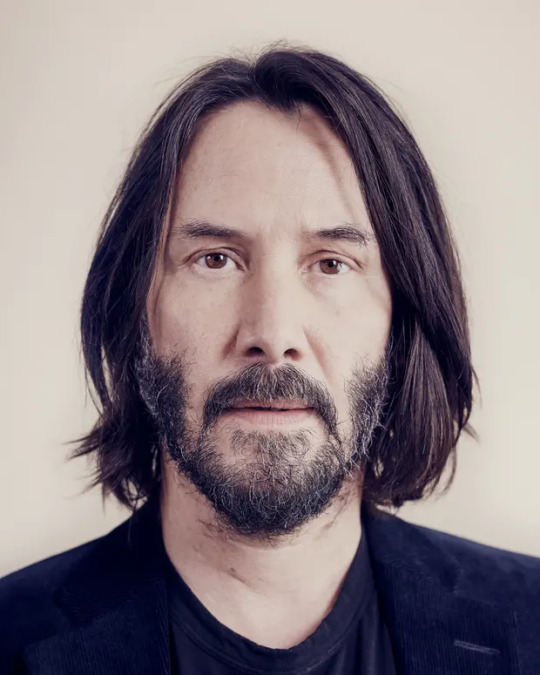
“Hey, I’m Keanu,” he introduces himself – unnecessarily, of course, and yet very Keanu-ishly. Despite being so famous his surname has long been superfluous, Keanu Reeves has always given the impression of being utterly unaffected by his own celebrity. He is regularly described by his co-stars as “kind” (Winona Ryder) and “humble” (Laurence Fishburne) and it is easier to imagine him walking on the moon than knocking back champagne with other celebrities on a yacht in St Barts. After all, the most famous paparazzi photo ever taken of Reeves was of him sitting alone on a bench, eating a sandwich out of a plastic bag. Hard to imagine Leonardo DiCaprio doing that.
“I’ll sit anywhere you want me to. This OK?” he says, taking a chair and offering me the sofa in the London hotel room where we meet. At just over 6ft, he is taller than I expected – also unusual for an actor – and dressed in a very Keanu outfit of dark shirt and trousers with sturdy boots. Despite being recently announced as the new face of the high fashion label Saint Laurent, Reeves has long been the patron saint of normcore, decades before it became a fashion statement. And I know this all too well because, from 1991–99, I had at least five posters of him on my bedroom walls modelling said look.
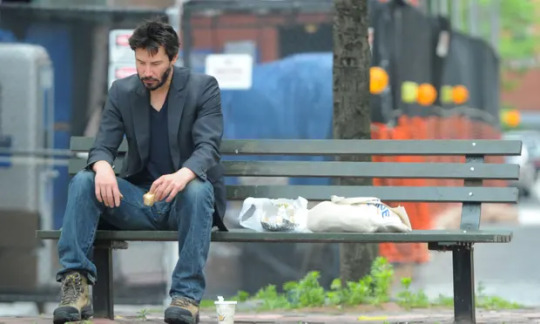
The 2010 photo of Reeves on a New York bench that sparked the Sad Keanu meme. Photograph: Splash News
Should one ever meet one’s teenage crush? Up until this week, I’d assumed I was long past the point of being starstruck – I’m a 40-year-old woman, for God’s sake! But now here I am, sitting opposite Reeves, now 54, the beard more grizzled than in my posters and the forehead suspiciously smooth, but still, most definitely Keanu. There’s that devastating smile he flashed at Sandra Bullock at the end of Speed, and there he is saying – and this is where I nearly lose all vestiges of professionalism – “Excellent!” while playing air guitar. Listening to the tape of our interview later is not an edifying experience, as I hear myself – Oh, dear God – flirt with Reeves (because, clearly, a heavily pregnant mother of two is the dream woman he’s been waiting for). Happily, my mortifying giggling soon abates, thanks to Reeves’ management of a situation he has presumably had to deal with every day of his life for the past four decades. And as he does, I get an insight into what it takes to be Keanu Reeves.

We are meeting today to discuss his latest film, John Wick: Chapter 3 – Parabellum. It will unquestionably boost the more than $3bn Reeves’ movies have grossed over the years. When he made the first John Wick film in 2014 – directed, as all the Wick films are, by Chad Stahelski, Reeves’ stunt double on the Matrix films – few expected that a movie about a former assassin avenging the killing of his puppy would amount to much. Despite starring in some of the most successful and seminal movies of the past 30 years – from offbeat hits like Bill & Ted’s Excellent Adventure and My Own Private Idaho, to blockbusters like Point Break, Speed and The Matrix – Reeves has been in at least as many damp squibs, including 2013’s 47 Ronin, one of the biggest box office flops of all time. Yet Wick, a stylish, brooding, ultraviolent revenge fantasy, was an unexpected hit with critics and audiences, and is now a mega-million dollar franchise, giving Reeves his first mainstream hits since the Matrix movies.
Part three – sorry, Chapter 3 – is larkier than its two predecessors, including one incredible scene in which Reeves offs some bad guys using an actual horse as a weapon (rest assured: the horse escaped unharmed). As a testament to the success of the franchise, there are more celebrity co-stars, including Halle Berry, and despite the naysayers when it comes to Reeves’ acting, he is terrific as a man still mourning the death of his wife. (She died at the beginning of the first John Wick film, from that terrible terminal disease, Convenient Plot Device.) “We certainly didn’t know when we started on John Wick that it would become like this,” says Reeves. “We’re only getting to tell these stories because of the audience. So thank you.” He salutes me in thanks, as representative of all the Wick audiences. (If you are imagining this is one of the times I giggled at him, you are correct.)

One of the canniest things about the Wick films is how they riff on Reeves’ public image. Once dismissed as an airhead by those who confused the Bill & Ted movies with reality, for the past two decades Reeves has been seen as a melancholic loner. The famous 2010 photo of him on a New York bench sparked what became known as the Sad Keanu meme, but it only struck a chord because the assumption already existed that Reeves – then in a career slump – was, well, a bit sad. Reeves, with polite firmness, denies that this echo is deliberate – “No, no, I don’t think about that” – although it is hard to believe it wasn’t in the film-makers’ minds as they shot endless scenes in John Wick 3 of Sad Keanu wandering alone through rainy New York streets, empty hotel corridors and a desert.
It quickly becomes clear that polite firmness is Reeves’ modus operandi when it comes to nosy questions: he will give the impression of being up for answering anything while, in fact, saying very little, or nothing at all. (Sample exchange. Me: “Was there ever a moment, maybe after Bill & Ted, when people started reacting differently to you and you realised your life had changed?” Him: “Um, no.” Me: “Really?” Him: “No.”) What this distancing tactic might lack in conversational intimacy, it makes up for in shutting down any embarrassing flirtations from women who should know better. You can’t kid yourself you are soulmates with someone who is building such protective walls against you.
So I’m surprised when he volunteers that Wick’s melancholy possibly has a connection to some of the most painful moments in his life. One other big reason the public perception of Reeves shifted from comedy stoner to faintly tragic figure was because, in 1999, his long-term girlfriend, Jennifer Syme, gave birth to their daughter Ava, who was stillborn. The couple broke up soon after, and two years later Syme was killed in a car accident. Reeves has never married, had any other children or even been reliably linked to other romantic partners since. He has also never spoken publicly about their deaths, and who can blame him? But given that the heart of the Wick films is about him mourning a lost love, the resonance is hard to ignore.
“With any character, the way I think about it is, you have the role on the page, you have the vision of the director and you have your life experience,” he says.
Did he bring his experience of bereavement to the role? “Oh yeah, I thought it was one of the foundations of the role for John Wick. I love his grief,” he says, visibly perking up at the subject.
What is it about grief that interests him? “Well, for the character and in life, it’s about the love of the person you’re grieving for, and any time you can keep company with that fire, it is warm. I absolutely relate to that, and I don’t think you ever work through it. Grief and loss, those are things that don’t ever go away. They stay with you.”
Has he been thinking more about the people he has lost as he’s grown older? “I don’t think it’s about getting older. It’s always with you, but like an ebb and flow,” he says.
Anyone in particular? “Lots of people,” he says, bricking those walls right back up.
***
Keanu Reeves was born in Beirut, Lebanon, the son of an English mother and Hawaiian-Chinese father. (His first name, as all Reeves-ologists know, is Hawaiian for “cool breeze over the mountains”.) With his sister Kim, the family moved around the world, from Australia to Manhattan, before finally settling in Toronto when Reeves was six. I reckon you can often spot an adult who moved around a lot as a kid, I tell him. “Oh yeah? How?” he says, intrigued.
They tend to have a sense of detachment, self-sufficiency, maybe loner tendencies and a strong sense of independence, I say. “Yeah, I clinically belong to that. I definitely have a bit of the gypsy in me,” he agrees.

Reeves’ father left the family when Keanu was three, and disappeared entirely from their lives when he was 13. He and his sister had multiple stepfathers.
That’s a pretty hard age for a parent to vanish off the scene, I say. “For sure, I think it’s definitely traumatising. But it’s hard to know how [it affected me] because I don’t know what the other life would have been, you know what I mean?” he says.
Did his father ever contact him again? “Yeah, in the mid-90s, but I didn’t reach back out,” he says.
This was after his father had been convicted for selling heroin? “Yeah, but that wasn’t why I didn’t get in touch!” he laughs.
So why not? “I just didn’t,” he replies, and that’s the end of that. But I can’t help but think of one of my favourite scenes of his, from Ron Howard’s 1989 ensemble comedy Parenthood, in which Reeves’ character muses about paternal figures: “You need a licence to buy a dog, or drive a car. Hell, you need a licence to catch a fish. But they’ll let any butt-reaming asshole be a father.”
Often the class clown at school, Reeves liked sport and loved acting, and got an agent as a teenager after being talent-spotted in a play. He dropped out of high school before graduation. “I feel really fortunate in a way, because I knew what I wanted to do, and a lot of kids that age don’t. But I had a creative ambition and I did it,” he says. After some early television work, Reeves started getting film roles, most notably in the cult 1986 teen drama River’s Edge, followed by Bill & Ted, and from there the work never stopped.
Back in the 1990s, he was the go-to pin-up for all teenagers who wanted a beautiful, gentle and safely asexual boyfriend (hi!). But his acting, if not his looks, has been a more debatable subject. “Is Keanu Reeves a Good Bad Actor or a Bad Good Actor?” a reader wrote in to ask the New York Times’ film critics in 2011 (the answer was, “Neither! A good actor, period”). Writing in the Guardian, self-professed superfan Joe Queenan put him in a small category of actors so beloved they are beyond criticism: “In most of [his best] movies, Keanu plays a character the audience views more with affection than with reverence or idolatry, like a kid brother who has bitten off more than he can chew and may need outside help to survive.”
Today Reeves has a good riposte to the criticism that he doesn’t, or can’t, act. “I certainly never got it from any of the directors I worked with,” he says, checking off some of the most respected in the business, including Bernardo Bertolucci (Little Buddha), Kathryn Bigelow (Point Break), Francis Ford Coppola (Bram Stoker’s Dracula), Stephen Frears (Dangerous Liaisons), Gus Van Sant (My Own Private Idaho) and Richard Linklater (A Scanner Darkly). “It’s not like I went to meet Kenneth Branagh [who directed him in 1993’s Much Ado About Nothing] and he was like, ‘Excellent, dude!’ You know?” He chucks in a little air guitar to boot.

It would have been pretty funny if Branagh had said that, though. “Of course! But the pigeonholing just comes from journalists and, yeah, that happens a lot. I generally don’t read the press but when I do I’m like, ‘Oh, OK, you’re doing that again,’” he says with a shrug.
I’ve never really understood the criticism. OK, he might not have been perfectly cast in Much Ado and acting opposite John Malkovich and Glenn Close in Dangerous Liaisons when he was only 24 was never going to be a fair fight. But he has always been a far more varied actor than the snarkers allow. He proved his superlative comic timing and endearing charisma in Bill & Ted’s Excellent Adventure and, when it comes to drama and sci-fi, no one is better at maintaining an inscrutable blankness. That quality is precisely what has driven so many directors to cast him, often as a messiah-like figure in movies such as Little Buddha, 2005’s Constantine (one of Reeves’ favourites), 1995’s Johnny Mnemonic and, of course, The Matrix. And of all the improbable actors who became action stars in the 1990s – Alec Baldwin, Nicolas Cage – Reeves seemed the most at home in the genre, in the still deliciously enjoyable Point Break and Speed, which he made in between smaller indie fare. So did he do the big movies in order to fund the smaller projects?
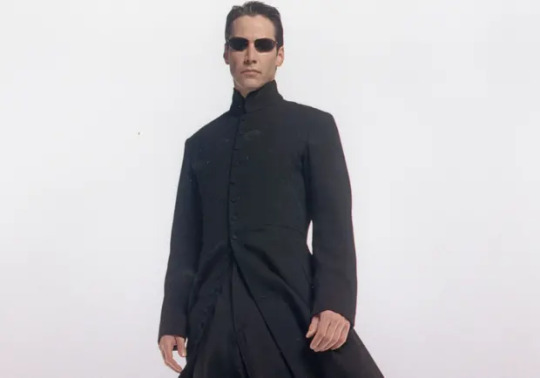
“Honestly, I try not to do anything I don’t want to do. But I guess those movies were in reaction to each other. It wasn’t as thought out as, OK, I finished Point Break, so now I’d better play a street prostitute. It was more like, OK, I finished this, now I want to do that,” he says.
“That” refers to 1991’s My Own Private Idaho, in which he and River Phoenix play street hustlers. Reeves had already met Phoenix through the latter’s girlfriend Martha Plimpton, with whom he had worked in Parenthood. The two quickly became friends, and it’s not hard to see why: both were young actors on the rise with a love of music and a pronounced lack of interest in the glitzier, red carpet side of their job. They were the anti-Brat Pack, and Phoenix, along with Alex Winter from Bill & Ted, were, Reeves says, “definitely my closest friends from that era. We shared an artistic sensibility. River was just so down-to-earth, spiritual and a unique artist. Yeah, I miss him,” says Reeves quietly. When Phoenix suggested the two of them make My Own Private Idaho, “I was in right away,” he says.
They had something else in common, a shared experience suggested in the now almost unbearably moving scene where the two sit by a campfire and talk haltingly about their childhoods.
Mike (Phoenix): If I had a normal family, and a good upbringing, then I would have been a well-adjusted person.
Scott (Reeves): Depends on what you call normal.
Mike: Didn’t have a dog, or a normal dad. Anyway, that’s all right. I don’t feel sorry for myself, I feel like I’m, you know, well-adjusted.
Scott: What’s a normal dad?
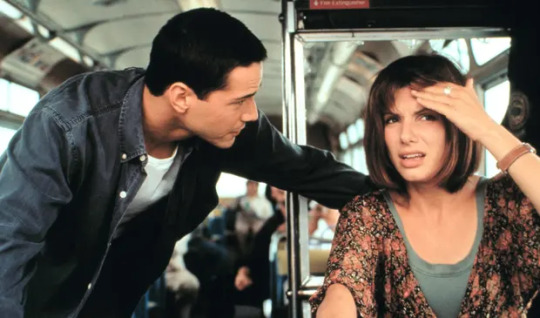
Phoenix’s dysfunctional childhood, growing up in a rackety family who for a time belonged to the Children of God cult, has been well-documented. Reeves’ was different, but no slouch when it came to potential trauma. Was that another thing that drew them together?
He ponders the question a full 10 seconds. “Certainly our histories played a role in that movie and in that scene. So I’ll say yes to that, yeah,” he says.
Two years after My Own Private Idaho’s release, the actor who desperately wanted to avoid every Hollywood cliche died the most cliched death imaginable, of a drugs overdose on Sunset Boulevard in 1993. Plenty of his contemporaries were also caught out, either self-destructing or becoming victims of their own success. Reeves adamantly refused to do either. When I ask how he avoided falling victim to drug addiction as Phoenix did, he says, as if it were the most obvious thing in the world: “I just wasn’t into that scene.”
It’s hard to tell if he’s being blithe or defiant when he insists he still lives his life totally normally, unaffected by fans. But if Leonardo DiCaprio went into a supermarket, there would be hysteria, I say.
“Yeah, but Leonardo has fame and fans that I don’t have in that way. Definitely. I don’t know what his experiences are, but I think someone from the outside would think [going shopping] might not be easy for him. Whereas I can, which is good,” he says.
Come on, surely fans bother him all the time? But the worst he can come up with is someone quoting Point Break at him in the airport the other day and someone, once, quoting River’s Edge when he was queueing at an ice-cream van. “And that’s fun!” he says cheerfully.
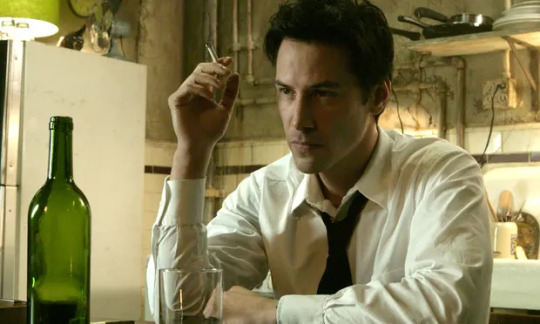
In the 1980s and 1990s, he was offered every hot young part under the sun, including the lead in Platoon (which went to Charlie Sheen) and Val Kilmer’s role in Heat. But when I ask if he regrets turning any of them down, he smiles and instantly replies, “No.” He also turned down a $12m pay cheque to make Speed 2 because he, rightly, thought the plot was nonsense, which resulted in him being shut out of 20th Century Fox films for the next 11 years (and no, he doesn’t regret that, either). He is about to start shooting Bill & Ted Face The Music, in which the now fiftysomething duo have to write a song so good it will save the universe. “There has to be a reason for making a movie, and the writers have come up with a good ‘why’ for telling the story,” he says. When I ask what gives him an ego boost, given that he’s not driven by money or fame, he is so baffled by the idea of his ego needing a boost that he is silent for a full 28 seconds before finally answering, “The work.”
Maintaining his privacy has been a major factor in helping Reeves retain his sanity, yet away from the press he can be extraordinarily open and laid-back. By a weird fluke, I have two friends who, separately, spent time with him in the 90s and both still talk about his generosity: he took them for rides on his motorbike and stayed in touch (yes, I am furious with them for not including me in any of this). There are legions of stories about Reeves’ kindness: buying his stuntmen motorbikes, renegotiating his Matrix contract so that the crew got a better deal, at a personal cost of millions of dollars. Shortly before we meet, Reeves was on a flight between San Francisco and Los Angeles that was grounded due to a mechanical fault. Instead of pulling rank with some “Do you know who I am?” A-list entitlement, Reeves encouraged his fellow passengers to board a van with him so they could drive to LA, keeping the mood up by sharing fun local facts and playing music from his iPhone. (Needless to say, footage of this quickly went viral.) So his four decades-long reticence with the media might well be Reeves’ most brilliantly sustained performance.
How we made Bill & Ted's Excellent Adventure Read more
But he bristles when I mention these stories. “I’m pretty private, so when that stuff doesn’t stay private it is not great,” he says.
Because he worries it will look like he’s just doing it for show? “No. Because it’s private,” he says with emphasis.
Ah well. I have accepted by this point that we probably won’t ride off together into the sunset on his motorcycle. But if the price of Reeves still being so recognisably Keanu-ish is him retaining a firm grip on his privacy and at least a pretence of normality, that feels like a fair trade-off. I assume doing this interview has been a torturous experience for him, so as we get up to leave I ask how he’d have preferred to spend the afternoon, in a dream scenario.
“Oh, I don’t know. This dream ain’t so bad!” he says, and gives me that full end-of-Speed smile again. And reader, I giggled.
• John Wick: Chapter 3 – Parabellum is in cinemas now.
If you would like a comment to be considered for inclusion on Weekend magazine’s letters page in print, please email [email protected], including your name and address (not for publication).
21 notes
·
View notes